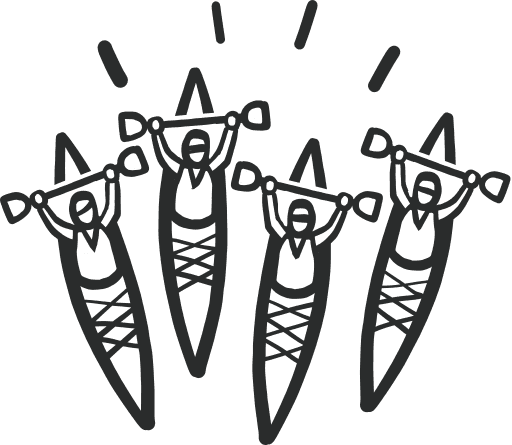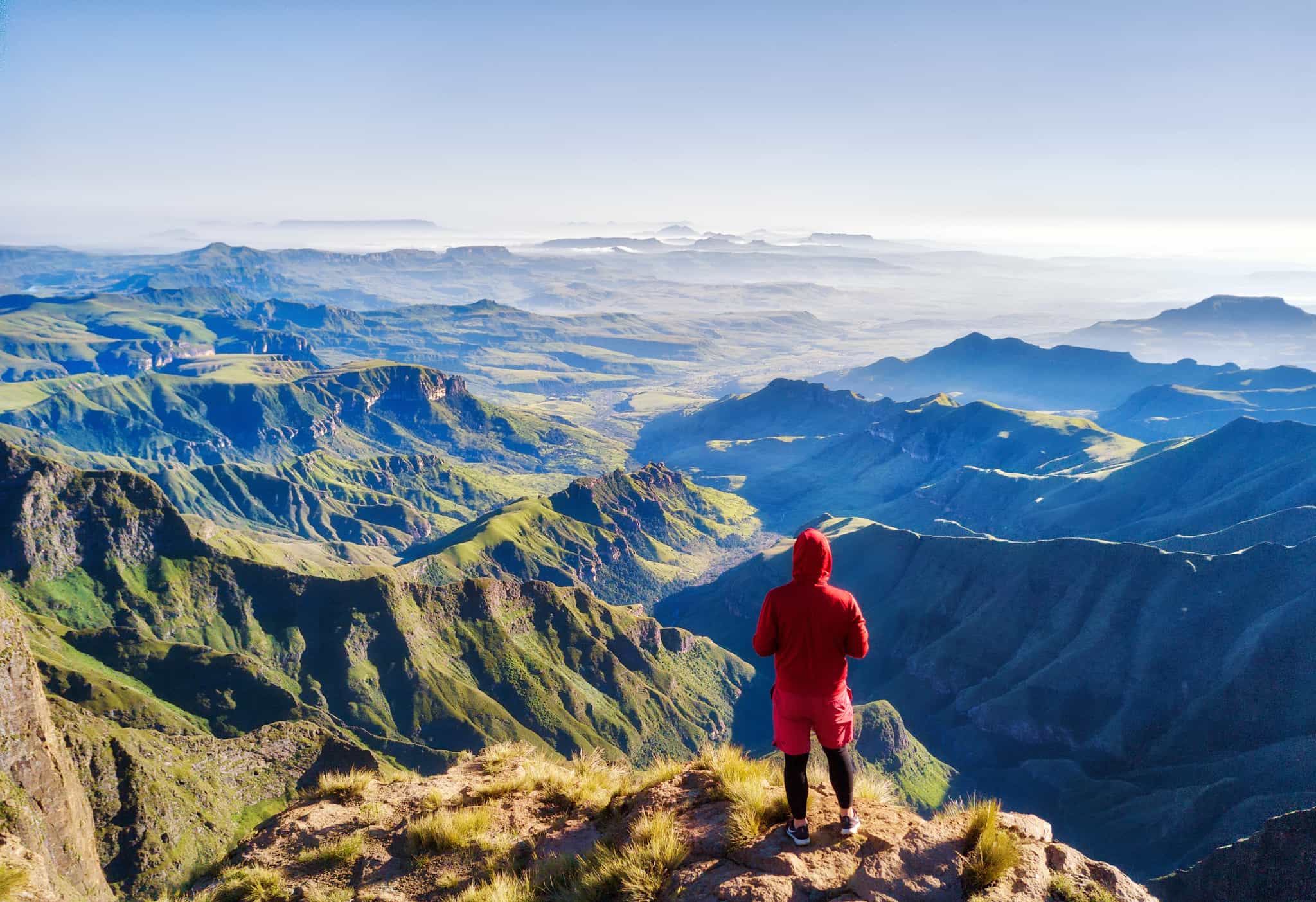
Hike, Kayak and Wild Swim South Africa
An epic adventure from the Drakensberg Mountains to the Wild Coast of the Rainbow Nation, paddling and swimming along the way
What's Included?
Activities & Certified Guides
All itinerary activities with expert, local, English-speaking guidesAll accommodation
1 night in a hotel, 5 nights in lodges, 2 nights in a bush camp and 1 night in a community homestayMeals
All breakfasts, 7 lunches and all dinnersTransfers
Airport transfers and everything in betweenEquipment & Permits
All your gear for rafting and kayaking, including National Park and Reserve entry fees and permitsSmall Like-minded Groups
Solo-friendly by design, join our small n’ sociable groups of up to 14 like-minded, active and outdoorsy people…
…
What's it like?





























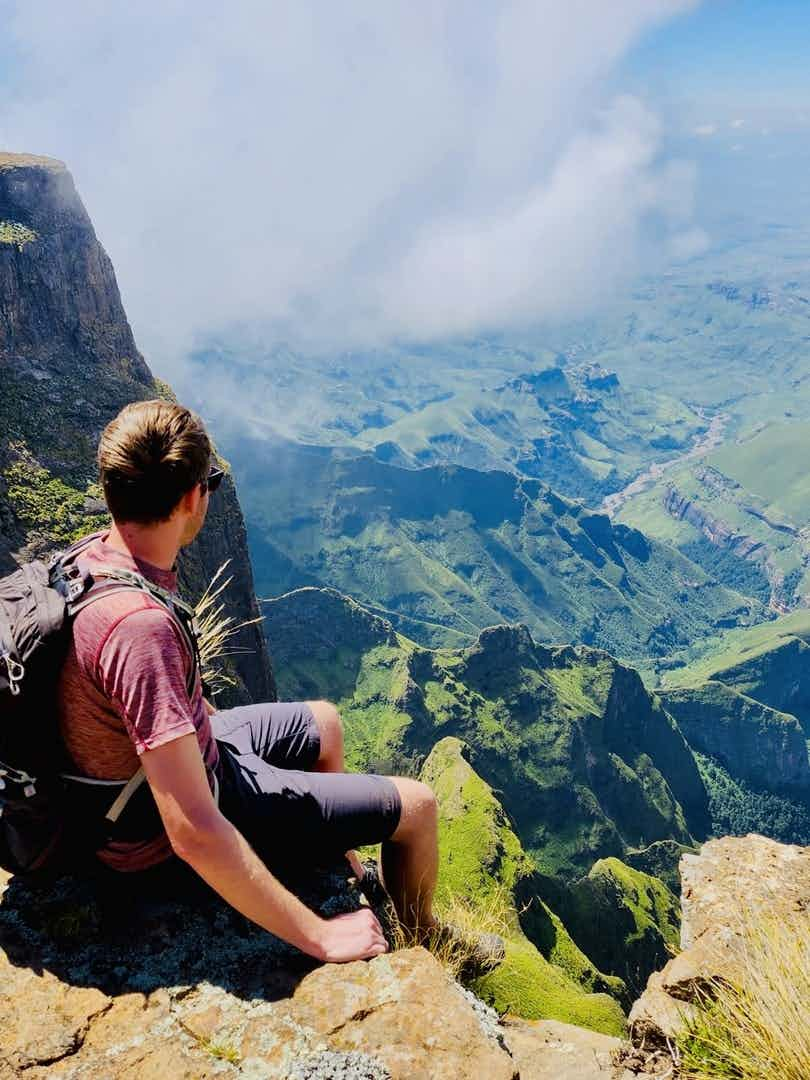
Tackle amazing trails through the iconic rock formations of the Drakensberg, including Sentinel Peak and Amphitheatre
Paddle down the Tugela River and explore the valley on foot, stargazing and wild swimming from your riverbank eco-camp
Hit the stunning Wild Coast for hikes through dunes, beaches and forests to reach secluded waterfall swim spots
Bed down in a village homestay, where tourism is a form of activism in the community’s fight against mining proposals
Key Information
Day 1
Touchdown in Jo'burg
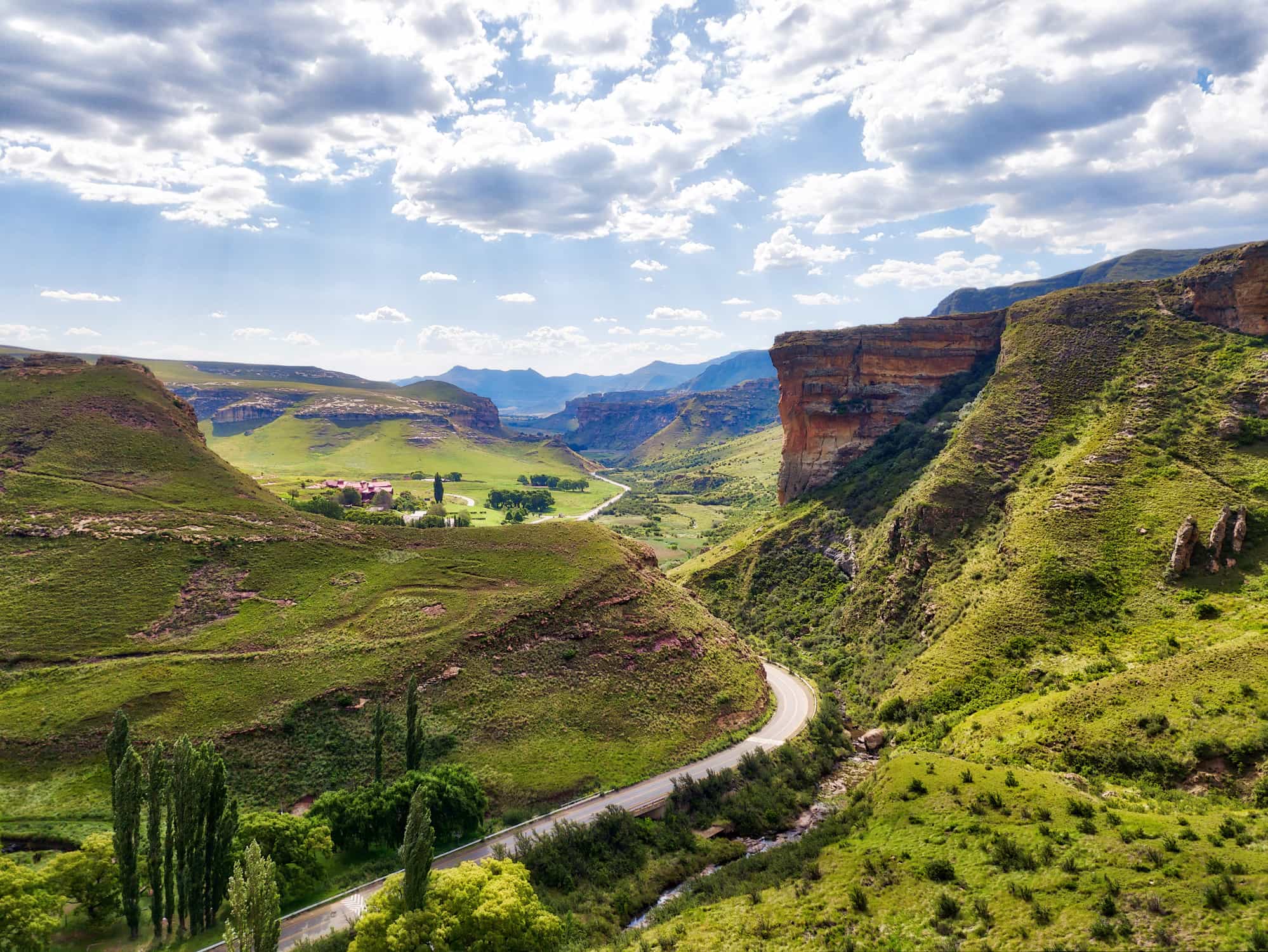
Driving
Arriving at Johannesburg's O. R. Tambo International Airport, you'll meet your driver for the transfer. Settle into the van with your fellow adventurers for a four-hour road trip through South Africa's interior, to reach the base of the Drakensberg Mountains. Check into your hotel, stretch your legs on a nature trail through the forest, or do some gentle pilates with your local host. Regroup at dinner time, where you’ll chat about the adventure to come.
Day 2
The hike begins
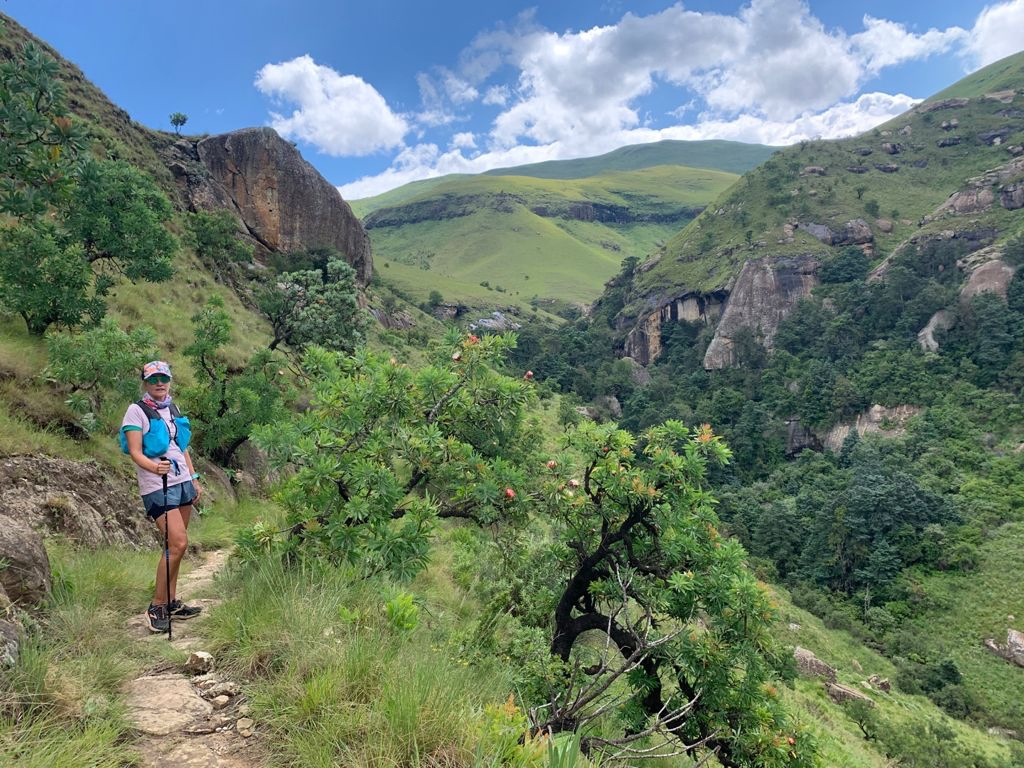
Hiking
Load up your trekking pack and leave your main luggage at the hotel as you set off for the wild trails of the Drakensberg Mountains. After a hearty breakfast at your hotel, hit the path with your local guide and hike up and over sandstone cliffs, via Lone Rock with its displays of San rock art. Continue up through a sloping section to reach Sugarloaf Gap and hike along the ridge, bypassing Broom Hill with sublime views across to the former homeland of QwaQwa, while bearded vultures circle overhead.
Day 3
Hike to Tugela Falls and summit Mont-Aux-Sources (3282m)
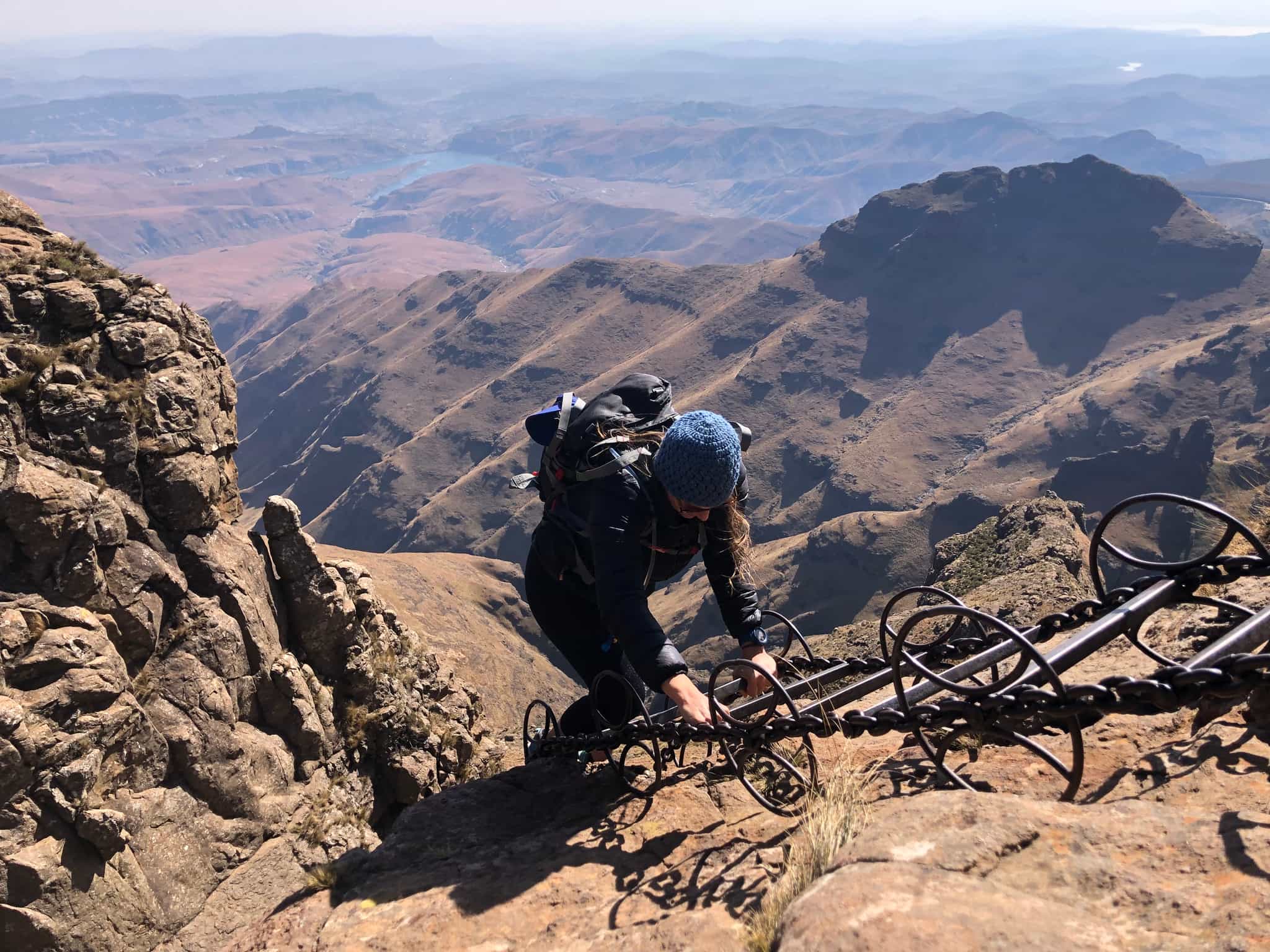
Hiking
Today’s hike starts with a short but fun 4x4 transfer to where the trail kicks off along a well-trodden path which ascends gradually towards the Witches and Zigzags, taking you to the base of the Sentinel massif. From here you’ll follow the contour path below the Western Buttress, with the land sloping steeply to the north and east giving you wonderful views of the Maluti Mountains in neighbouring Lesotho. The action ramps up after 3km when you reach a network of chain ladders to help you navigate a 35m ascent, followed by a short scramble from there to the escarpment top. There’s the option to summit Mont-aux-Sources (the highest peak in the area at 3282m) before hiking across to Tugela Falls. With a 983m freefall over the escarpment, Tugela vies with Angel Falls as the highest waterfall in the world.
Day 4
From the 'Berg to the River Valley
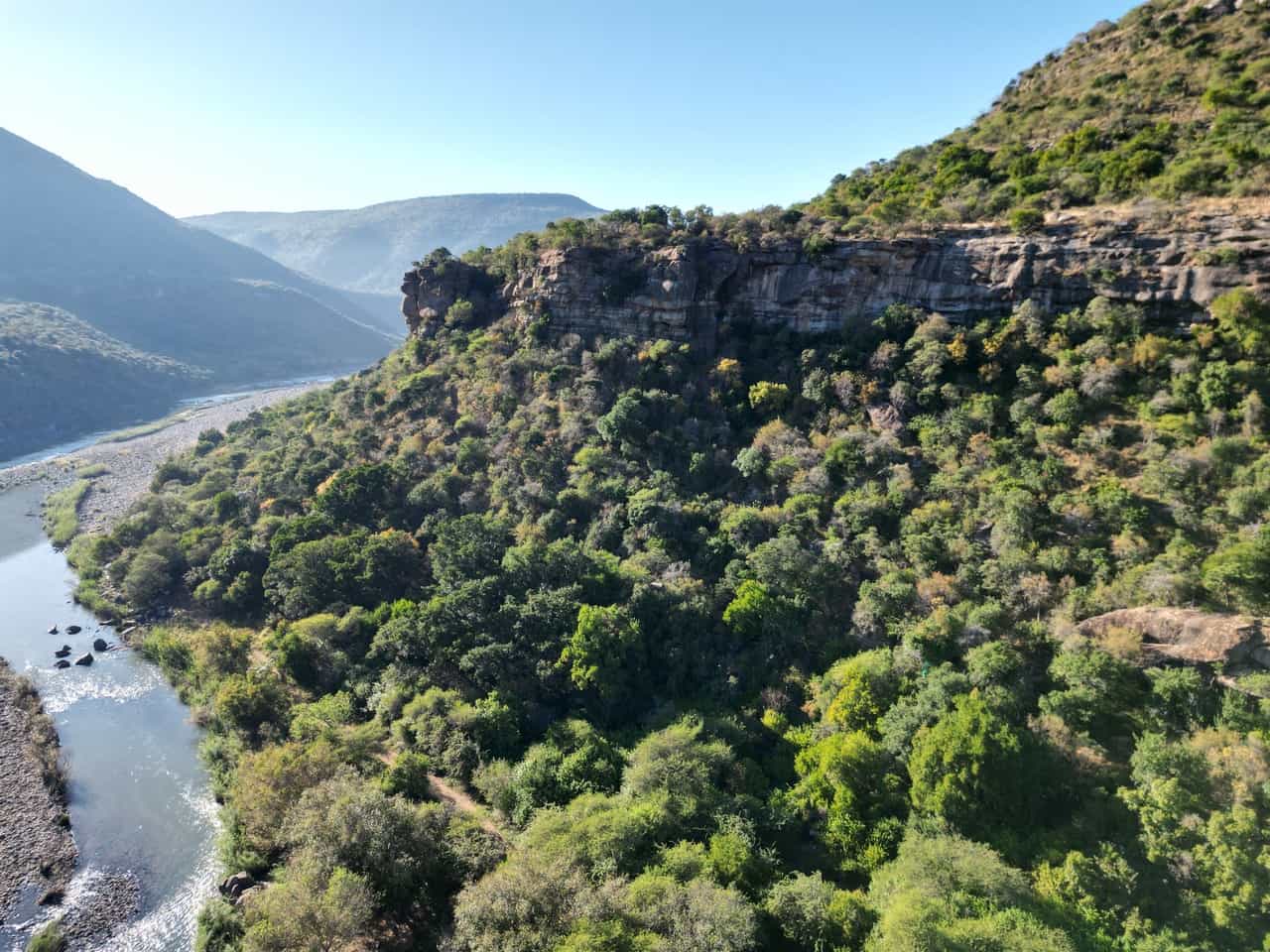
Hiking
Rafting
Lap up the last of the views from this epic spot as you hike down the beautiful Mahai Valley. There are a series of waterfalls and natural swimming pools along the way, so make sure you've packed your swimmers. After your hike, say bye for now to your Drakensberg host and jump in a transfer to Colenso, where you’ll be met by your next host in the Tugela River Valley. Once at camp – eyes peeled for wildlife – tuck into lunch and settle into your riverside abode. Your activities here will be led by the weather, seasonality and what the group wants to do: you can paddle down to Warthog Island (either by whitewater raft or by kayak, depending on the river's water levels), hike to an incredible look-out point to abseil down the rock at sunset, or simply zen out in a hammock. Back at camp in the evening, wrap up an exhilarating day with a delicious dinner enjoyed under star-studded skies.
Day 5
Walk with giraffes and adventure on the river
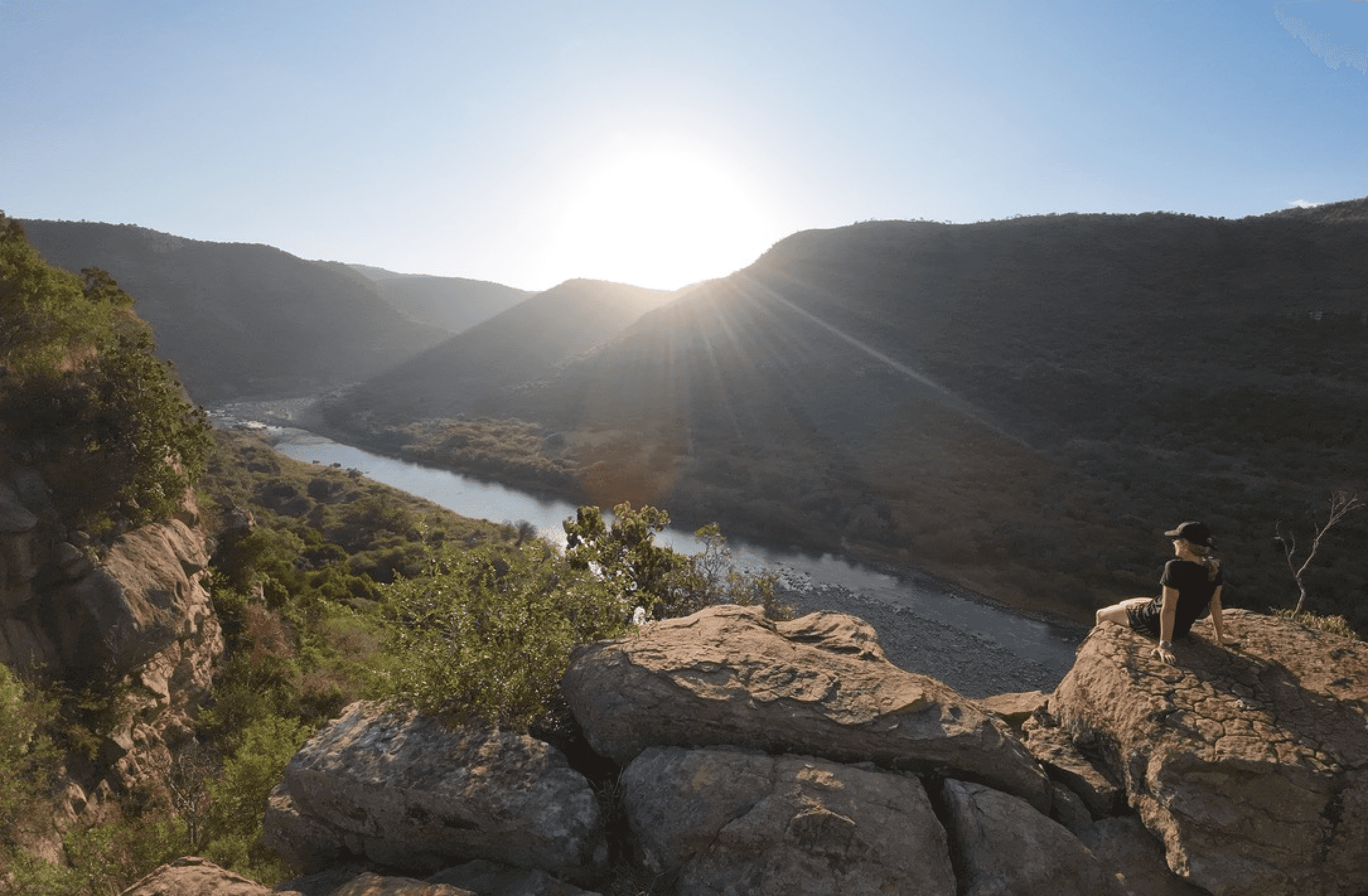
Rafting
Wild Swimming
Rise in the cool of the early morning for a stroll around Hippo Hill, where there's the chance of a close interaction with the relaxed resident herd of giraffes. An unforgettable start to your day, you're also likely to encounter antelopes, warthogs and a plethora of birds before returning to camp for a hearty breakfast. If river levels are right (usually from January to March) it’s possible to do a longer section of rafting; alternatively, you can hike to a secret waterfall. There will be plenty of time to soak up the tranquil surrounds of your riverside camp with a refreshing dip, or simply kick back by the riverbank. A sunset abseil is highly recommended if you didn’t get to this do this the day before. Enjoy another night of open-sky dining around the campfire before tucking in for the night.
2026
For trips departing in 2026, an extra day will be spent in Tugela. Today is all about soaking up the wilderness surroundings at your riverside camp. After tucking into another tasty breakfast, you can be as relaxed or as adventurous as you like – kick back in a hammock, jump into the Tugela River for cool swims, or take a wander through the bush (on the lookout for giraffes and impala). You’ll enjoy a leisurely lunch under the shade of the Tamboti tree, and wrap up the day with campfire vibes and a final tasty meal courtesy of the Zingela Camp crew.
Day 6
Road trip to the coast
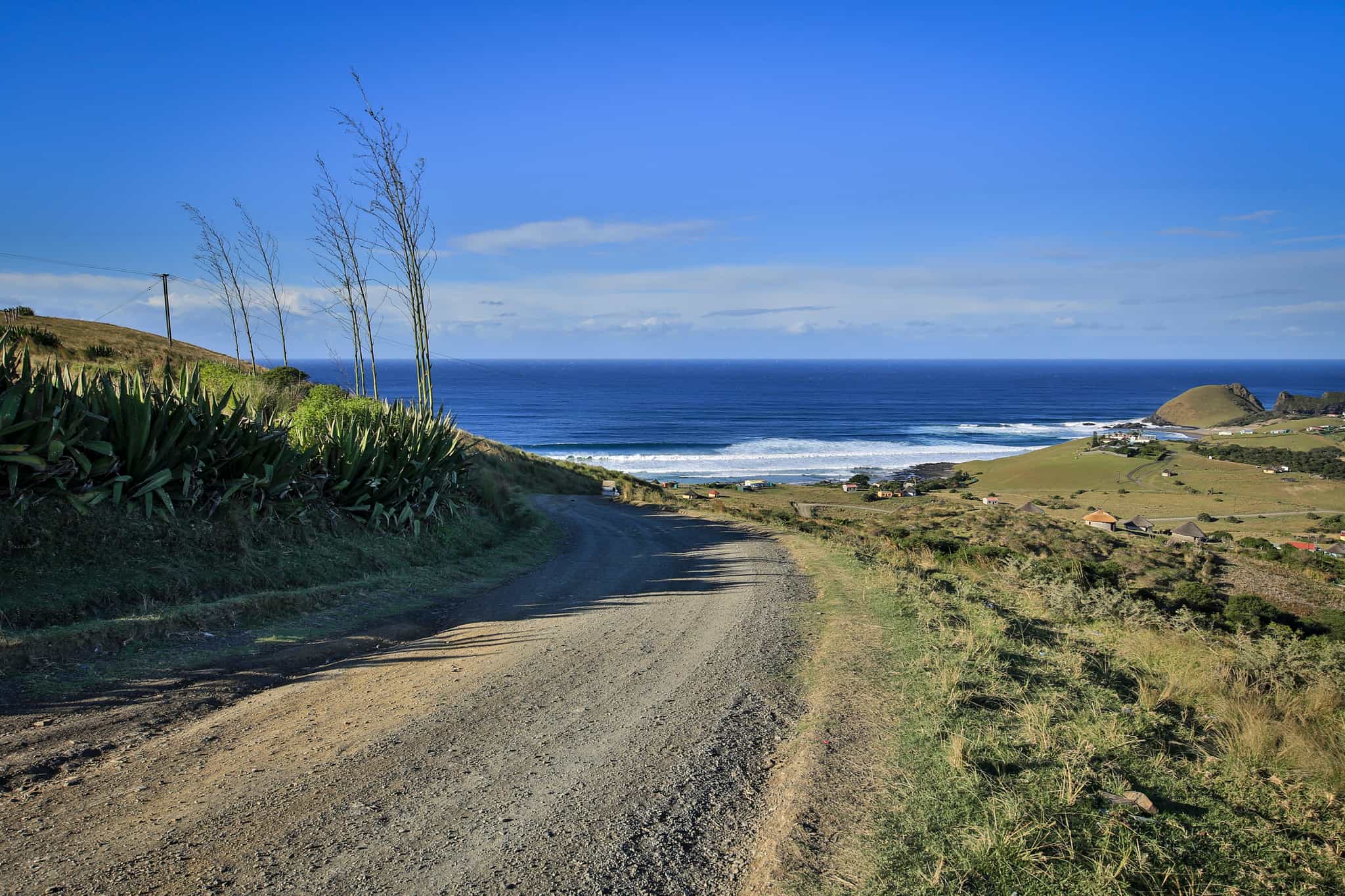
Hiking
Driving
Relish one last bush walk before returning for a cool shower and leisurely breakfast. A 4x4 journey returns you to Colenso, where you’ll bid the Tugela team farewell. Settle back into the van for a five-hour road trip to the Wild Coast. On the way you will reunite with your guide from the first few days of your adventure before reaching your lodge on the Mtamvuna River, the border of the Eastern Cape.
Day 7
Hike the Wild Coast to a community homestay
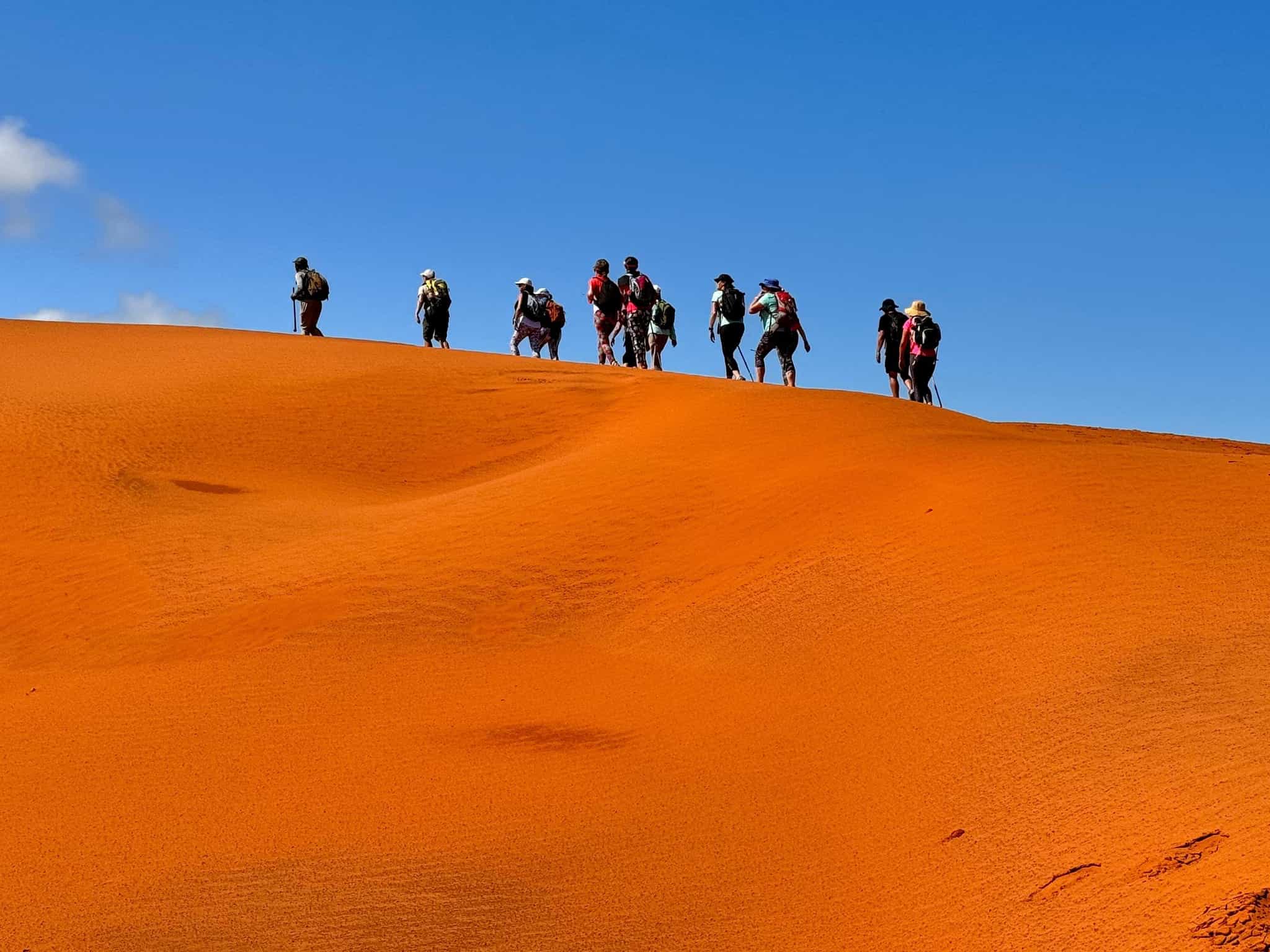
Hiking
Time to hit the hiking trail on South Africa's famous Wild Coast. A short boat ride will take you to the river mouth, where you’ll meet your local Pondo guide and set off along the beach. Stop off at a petrified forest and the Mzamba fossils, before reaching the Nyameni River. From here, head inland over grassy dunes, arriving at the Xolobeni community for a warm welcome. During this homestay experience you'll gain an insight into local village life and hear how this community uses the income from tourism to fight proposals for prospective mining projects in the area. Enjoy a beer at the local shebeen or a visit from a traditional healer, before feasting on a traditional Xhosa dinner and settling down for the night.
Day 8
Xolobeni to Mtentu
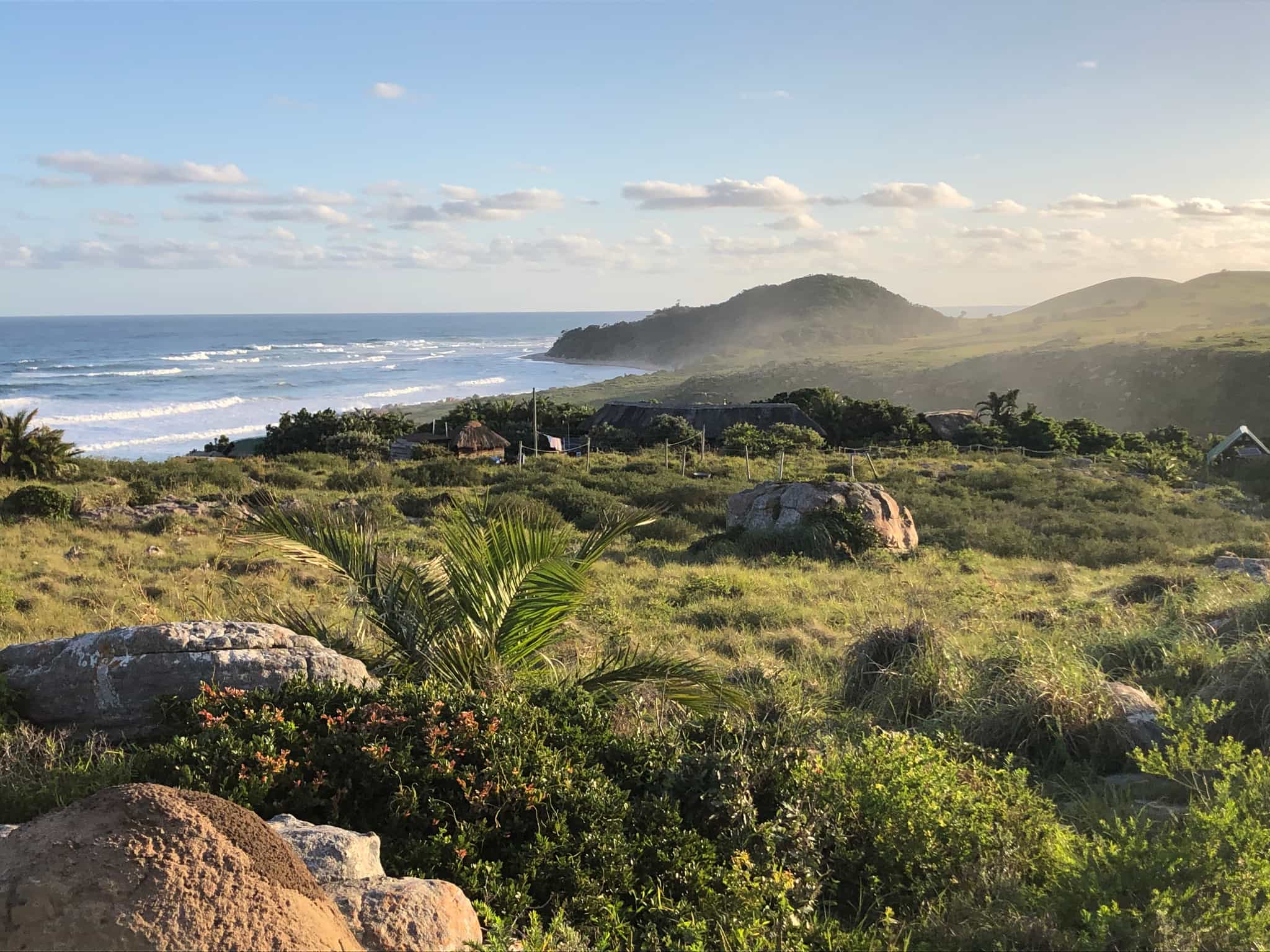
Hiking
After breakfast, bid farewell to your homestay hosts and hike back to the beach then on towards Mtentu, passing through the red sand dunes. Your guide will offer insight into the cultural and archaeological significance of these dunes, with human occupation dating back to the last ice age. Today’s hike ends at a community-owned ecolodge – your final base for the trip. Perched above the alluring Mtentu River estuary, it’s a short stroll down to the beach where you can dip in the waves or wade into the warm waters of the estuary.
Day 9
Chasing waterfalls and swim spots
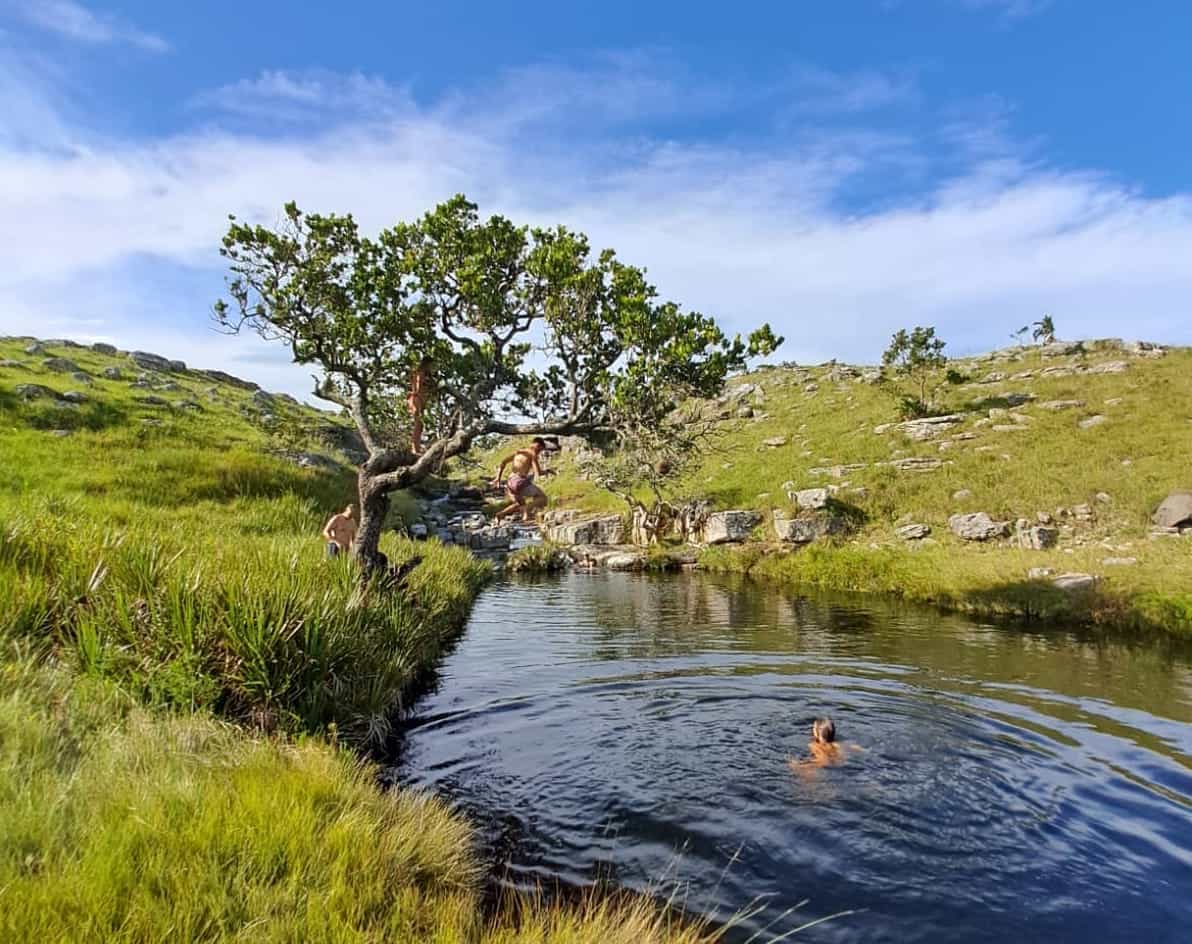
Kayaking
Hiking
Wild Swimming
Today’s adventure will immerse you in the river environment. Jump in a kayak or canoe to paddle up the cliff-lined estuary until you reach a small inlet. Here, secure your kayak and then hike upstream, scrambling and wild swimming your way up the cascading tributary to reach Swallowtail Falls. This majestic waterfall is surrounded by a natural amphitheatre of rock, plunging into a deep pool which beckons a rock jump and wild swim (if you do feel like taking this final day a little easier, you can take a more gentle amble to a viewpoint with a swim at Paradise Pools providing a relaxing end to your time on the Wild Coast). Back at the lodge, celebrations are the order of the day, as you toast to an epic adventure.
Day 10
So long, South Africa
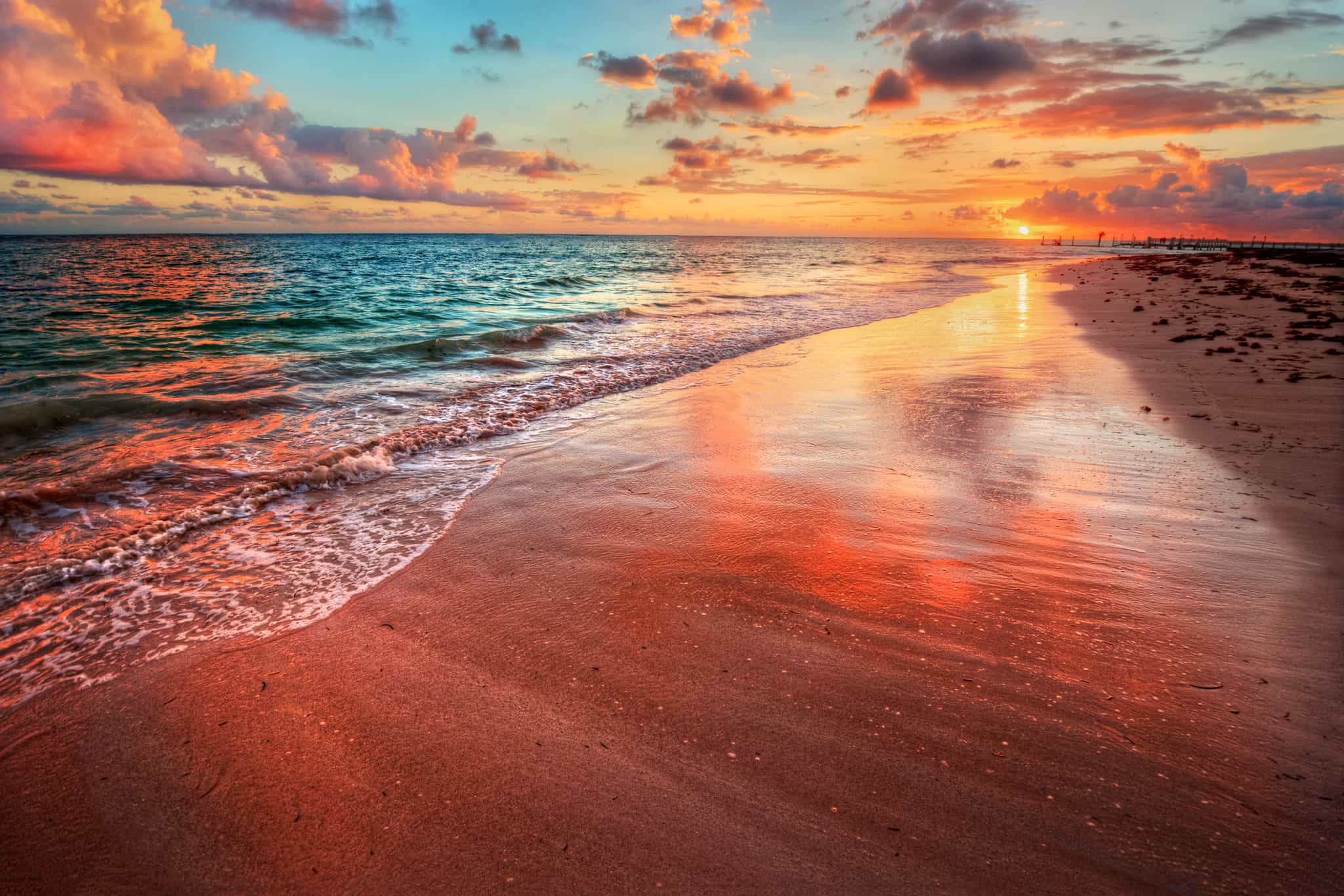
Driving
After the last breakfast of the trip, you’ll be collected for a 4x4 transfer back to Mtamvuna River. You'll collect your main luggage before continuing on to Durban's King Shaka International Airport in time for onward flights, departing late afternoon or evening.
The Area
Logistics
Starts
Johannesburg O. R. Tambo International Airport
10:00 on Day 1
Ends
King Shaka International Airport, Durban
14:00 on Day 10
Transfers
On Day 1, a group transfer will be arranged from O. R. Tambo International Airport (JNB) to the first night's accommodation in the Drakensberg, which is around a 4.5-hour drive. The transfer time will be coordinated based on the latest flight arrival time, so you should aim for an early morning arrival into Johannesburg in time for meeting your group at 10.00am. Please arrive by 09:30 to ensure you have plenty of time to meet at 10:00. Your host will provide the transfer driver's contact details in your pre-departure information.
On Day 10, after breakfast there will be a 2-hour group transfer to return to Mtamvuna River lodge to collect your main kit bags, followed by another 3-hour group transfer to Durban King Shaka International Airport (DUR). Estimated arrival at King Shaka is from 14:00. It is recommended to book connecting flights departing from King Shaka from 16:30 onwards.
A group airport transfer is included on arrival on Day 1 and on departure on Day 10. Given the distance and duration of the arrival and departure transfers it is highly recommended to arrange your flights and onward travel arrangements so that you can take the inclusive group co-ordinated transfers.
If required, private transfers can be arranged by your host, subject to driver availability, at an additional cost.
For 2026, the trip is one day longer, so finishes on Day 11. Departure transfer arrangements are the same, but just one day later. Dates on the website are correct and make the allowance for the extra night.
Travel options
There are direct flights to Johannesburg from major hubs in Europe and North America, such as London, New York, Washington, Paris and Amsterdam. Travellers from other start points in Europe and North America can transit through any of the aforementioned hubs.
Day 1
Breakfast
Lunch
Dinner
Day 2 – Day 3
Breakfast
Lunch
Dinner
Day 4 – Day 5
Breakfast
Lunch
Dinner
Day 6
Breakfast
Lunch
Dinner
Day 7
Breakfast
Lunch
Dinner
Day 8 – Day 9
Breakfast
Lunch
Dinner
Day 10
Breakfast
Lunch
Dinner
What is the food like?
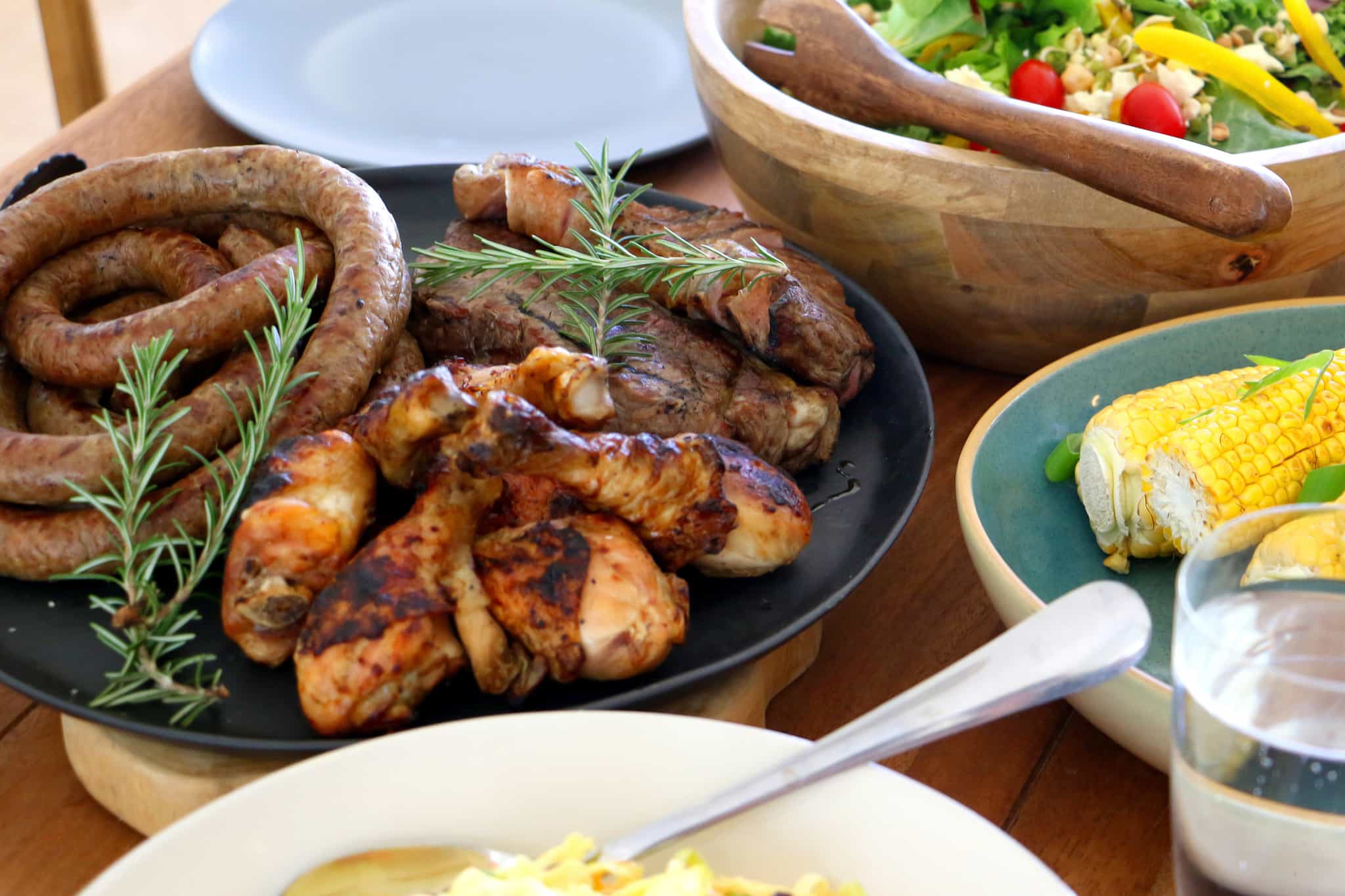
Breakfasts on this trip are usually a combination of fresh fruits, yoghurt and granola and/or the option of a full English breakfast with an African twist (such as crumbly pap served with spicy tomato relish). Morning tea or coffee is almost always accompanied by a homemade rusk (much like a dehydrated cookie), so you can perfect the art of dunking it in your tea for just long enough. Trail lunches tend to be what can be easily carried – rolls or wraps with filling, trail mix and most South African’s favourite snack – biltong or droe-wors (meat that has been salted, cured and hung to dry). Dinners are as diverse as they are flavourful, from Cape Malay curries to rich oxtail stews and no doubt a good South African braai or two. At Tugela Bush camp you’ll sample slow-roasted meat such as a wild boar spit. The braai ‘sides’ are just as important: pap (corn grain made into a stiff porridge) served with chakalaka, five-bean salad, braaied mielies (corn on the cob) and roosterkoek (often garlic bread roasted over the coals) are firm favourites. At the homestay, you'll fill up on warm xhosa pot bread (traditionally made in a heavy cast-iron pot with a lid over an open fire) dunked with chicken curry and locally harvested vegetables – such as wild spinach imfino, roasted butternut tops and samp (dried corn kernels), and sugar beans.
Vegetarians are easily catered for on this trip, but fully vegan is a little more tricky in the more rural areas, where dairy and egg alternatives are harder to come by. Other dietary requirements and allergies can be catered for. Please just request this on your passenger info form.
What is the accommodation like?
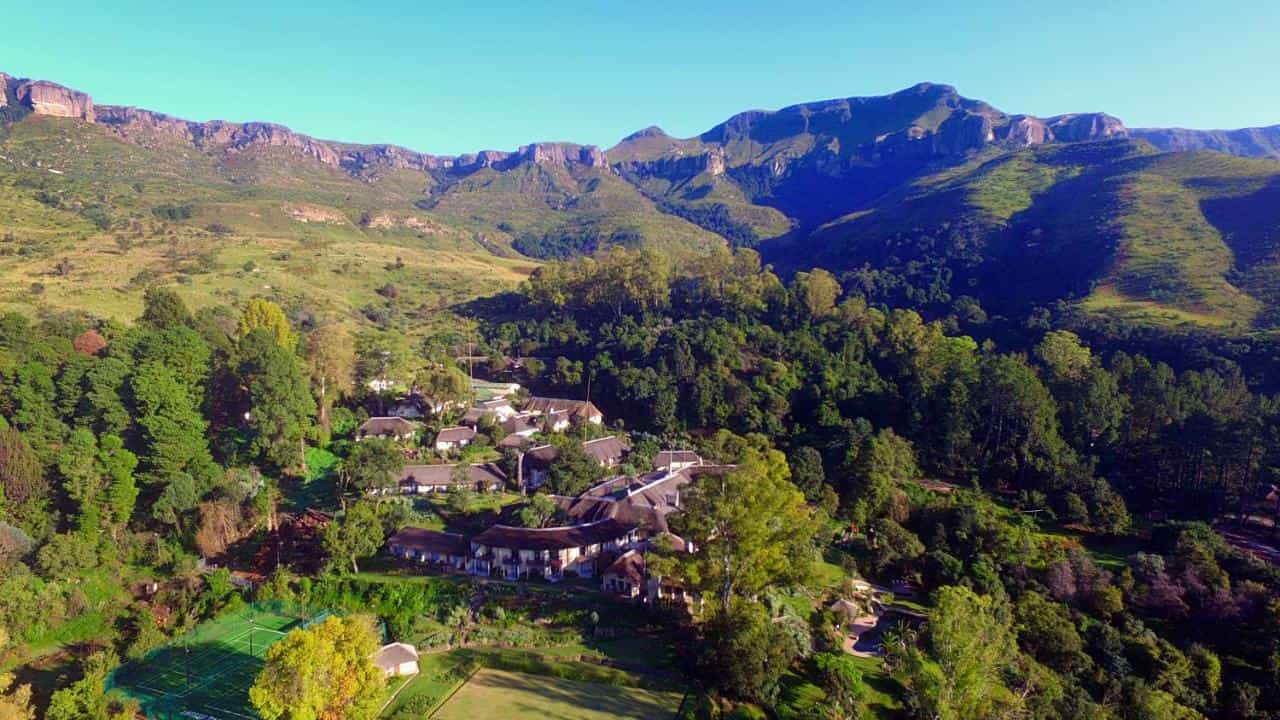
Cavern Resort & Spa
You'll bunk down for one night at the Cavern Resort & Spa in a spectacular spot, following a road trip through South Africa to reach the Drakensberg Mountains. You'll stay in twin-share rooms with ensuite bathrooms.
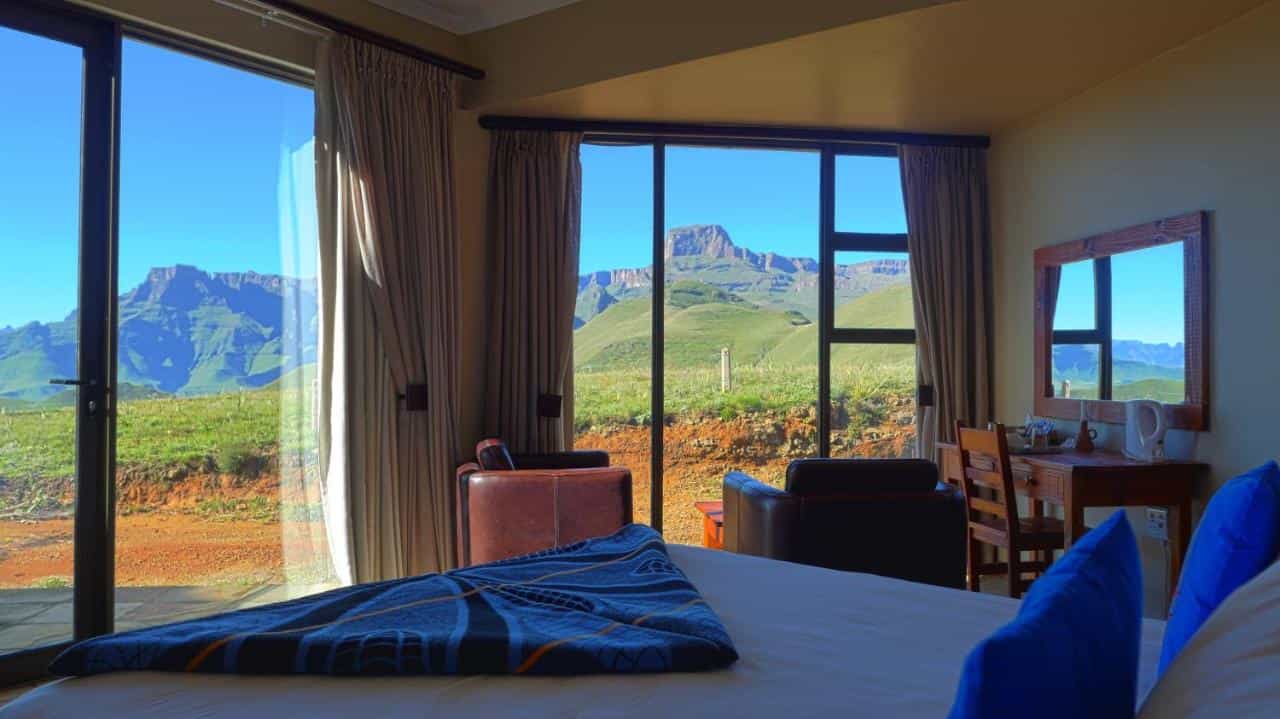
Witsieshoek Mountain Lodge
Nestled in the Maloti Drakensberg Transfrontier Conservation Area is the Witsieshoek Mountain Lodge. Sitting at 2285m above sea level, it's the highest lodge in the Northern Drakensberg and overlooks the stunning Sentinel Peak and iconic Amphitheatre. You'll stay in twin-share rooms with private bathroom facilities.
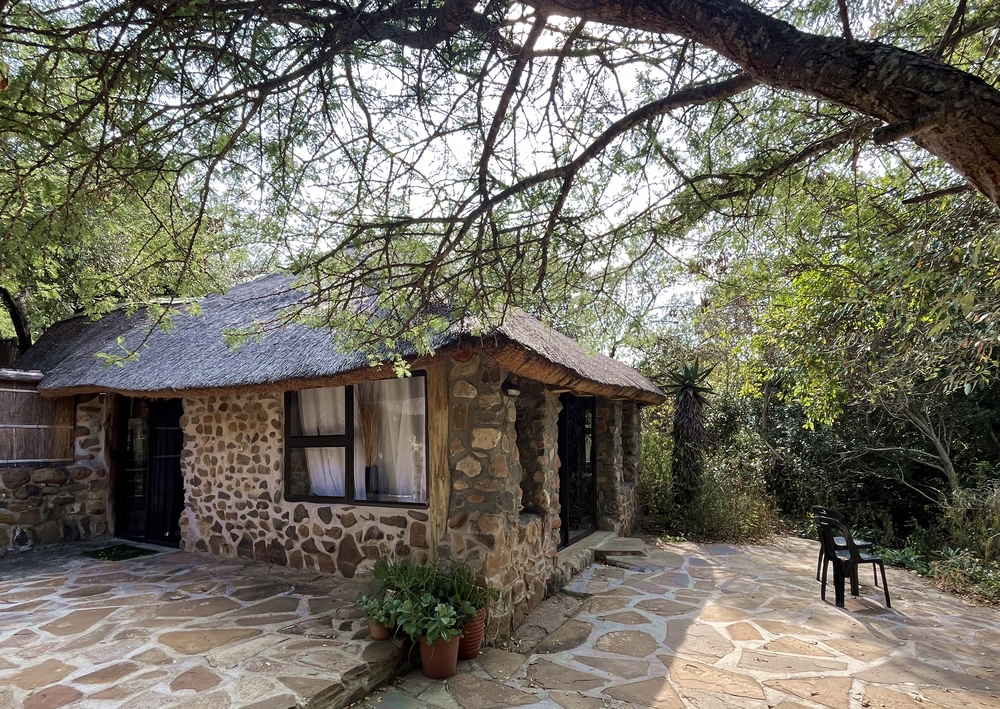
Zingela, Tugela River Valley
Located in between the Drakensberg and the Wild Coast, you'll spend two nights at the beautiful and unique Zingela Bush Camp. Nestled among the diverse ecology of the Tugela River valley, your stay here will be relaxing and restorative, with plenty of hammock time, campfire dinners and stargazing after your active days. You'll stay at the main camp with thatch, stone and canvas dwellings and delightful outdoor showers overlooking the bush.
2026
On departures in 2026, you will spend three nights here, as per the itinerary (Day 5) and the related 2026 FAQ.
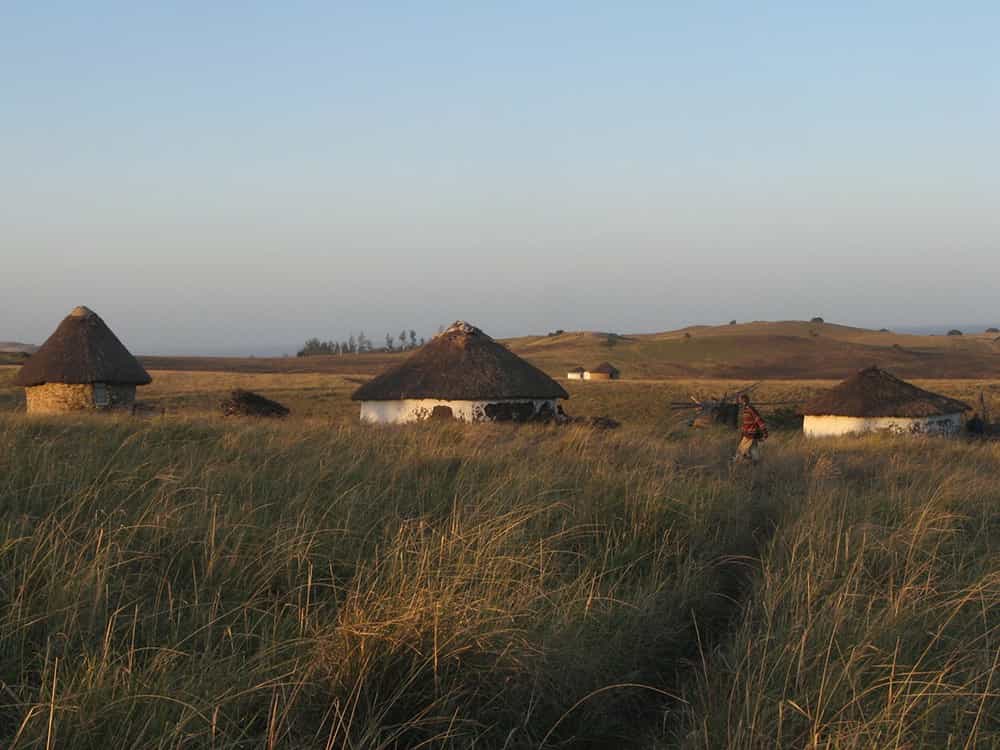
Xolobeni Community Homestay
On the Wild Coast you'll spend a unique evening at a village homestay, bunking down in traditional mud and thatch-roofed rondavels – a type of African hut. The setup is basic: you'll bed down on single mattresses on the floor (with bedding provided) on a same-sex, multi-share basis, and shared bathroom facilities. This is a real, authentic cultural experience – get to know your hosts, learn about their village life and enjoy a traditional Xhosa dinner.
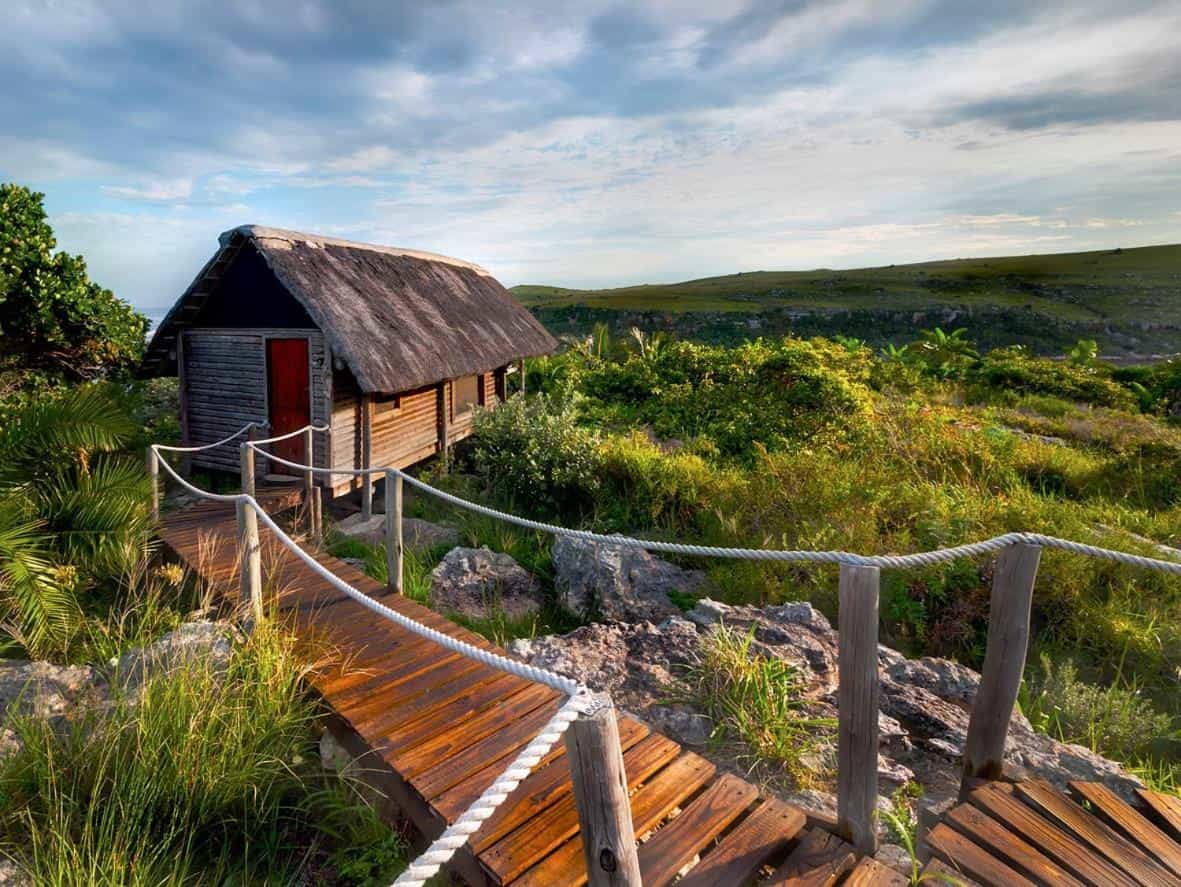
Mtentu River Lodge
Your final two nights of the trip are spent at Mtentu River Lodge on South Africa's Eastern Cape, which is managed by the local community. Wood-and-thatch accommodation is set in a spectacular natural setting, with wooden walkways meandering around the lodges. You'll stay in same-sex, twin-share rooms with bathroom facilities shared with other members of the group. There is a stunning private beach at the lodge – perfect for evening sundowners.
Upgrades
For solo travellers looking for their own space, an optional private room and tent can be booked throughout the trip for an extra charge, see Optional Extras. Please note this does not apply for the night at the homestay in Xolobeni. Please request this at the time of booking (this is subject to availability).
This trip has been rated as Moderate
Overall this is a very manageable trip by anyone with good fitness levels who is comfortable hiking for 4-6 hours a day, sometimes on consecutive days. The toughest section of the trip is at the beginning when you will be gaining considerable elevation during the hikes in order to get to the best viewpoints and summits in the Drakensberg. On Day 3, there is a section on the way to Tugela Falls which requires you to navigate a network of chain ladders to help you with a 35m ascent, followed by a short scramble from there to the escarpment top. This section is quite exposed, and it helps if you have a head for heights. On this day, the (optional) summit of Mont-aux-Sources is at an altitude of 3282m, although most of the trip takes place at much lower altitudes. The days at the Tugela River and on the Wild Coast are lighter and steadier days, with less elevation to tackle on the hikes. You won't need any previous experience for the kayaking or rafting here either, just a sense of adventure and a willingness to get your feet wet! You also don't need to be able to swim to join the trip, although this will definitely enhance your enjoyment.
In the Drakensberg Mountains, during the summer months of December to February, temperatures in the lower elevations can range from 20-30°C (68-86°F), while temperatures in the higher elevations can range from 10-20°C (50-68°F). During the winter months of June to August, temperatures in the lower elevations can drop down to 10-20°C (50-68°F), while temperatures in the higher elevations can drop below freezing, with occasional snowfall.
The Eastern Cape province of South Africa has a varied climate with different regions experiencing different weather patterns. The coastal regions are generally milder and wetter, while the interior regions are drier and have greater temperature extremes.
The Eastern Cape and Wild Coast area has a temperate climate, with warm summers and cool winters. The summer months of December to February are generally warm to hot, with temperatures ranging from around 20-30°C (68-86°F) in the coastal regions and 25-35°C (77-95°F) in the interior. The summer months also tend to be the wettest, typically with afternoon rainstorms that pass through quickly. The winter months of June to August are cooler and drier, with temperatures ranging from around 10-20°C (50-68°F) in the coastal regions and 5-15°C (41-59°F) in the interior. Frost and occasional snowfall can occur in the high-lying areas of the province during winter.
I would do it all again!
I loved this trip. It was my first with MBA and I can’t praise them highly enough. I chose this trip because I was going to be in South Africa and because it looked to offer a lot of variety. It certainly delivered. I walked in mountains, coast, desert and in a nature reserve. The mountain part was my personal favourite. It was outstanding. I also got to abseil and raft. It was adventurous enough to be exciting without feeling that I was risking my life! The accommodation was varied but all fantastic either in terms of luxury or quirkiness. Our host and guide Sophie, was such a positive energy, fun and responsible in equal measure. She consistently went over and above to ensure everyone had a good time. Our local guides were great too, generous in sharing their knowledge and information. The trekking was challenging at times, but so rewarding. I would do it all again but MBA have many other tempting offers. I’m already looking for my next trip.
Amazing trip
Fantastic trip in three distinct parts! Incredible mountain hiking with breathtaking views, exhilarating river fun surrounded by wildlife, and spectacular, almost deserted coastlines. The trip was well-organised, well-paced and a perfect opportunity to get away from the tourist trail - all run by wonderful local guides. You’ll come back pleasantly exhausted and inspired. I cannot recommend it enough!







I didn't want to go back home.
What an amazing experience this was!
I won't lie: the mountains were a rough start. I underestimated how difficult hiking at altitude would be and had a very challenging time while in the Drakensberg. Our host Sophie and our local guides, Mlungisi and Jeff, (as well as 6 strangers I had just met!) were very patient and understanding while I brought up the rear at a considerably slower pace. Jawdropping views, spectacular chain ladders, swimming at the top of a waterfall, skittering lizards, herds of wild horses, and unbothered baboons made every difficult step worth it.
When we transferred next to Zingela, I was flabbergasted. MBA's description of this area doesn't do it justice. It is a HUGE conservation area with a thriving population of giraffes (we saw a tower of 41!), plus wild boar, warthog, kudu, nyala, cape weavers, shongololo :-D, and so much more. The folks who own it run a tourism business which includes rafting, abseiling, and camping, but they also conduct research into the social behavior of giraffes, monitor the movement of marine species in the Tugela River via tagging, host local and foreign students, and aim to be as self-sufficient and carbon neutral as possible. It is a magical place. Our guides Jugs & Mpo were fantastic and made my first ever abseiling experience such a hilarious and fun time. I learned a fair bit about Zulu culture from them, as well. The wonderful ladies who cooked all our meals have my undying gratitude; everything was unfailingly delicious.
Onto the Wild Coast and beautiful beach hikes. If you aren't used to hiking on sand, this can be a bit tough on the feet. I walked most of the beach barefoot during this part of the trip and if my feet hurt, I didn't notice because walking along the Indian Ocean was such an adventure: fossils, petrified wood, a huge diversity of shells, titanium-rich sand, estuary crossings, and archaeological finds such as arrow- and axe-heads & flint knives. Our guide for the Wild Coast, Lonwabo (“Lolo”), shared many interesting stories about Pondo culture, cuisine, plantlife, history, and medicine. However, he also recounted the effect illegal foreign mining efforts have had on the land and how the locals are still fighting to keep these companies out. Lolo’s love and respect for the Pondoland is infectious.
The homestay at Xolobeni is a unique accommodation, and I think it's an important part of the trip for tourists to experience how many South Africans outside of the cities live. The lovely woman who owns it is a generous host and made us feel incredibly welcome.
Finally, Mtentu Lodge: no electricity & no cell signal! It's a perfect way to wrap up the trip, causing you to pause and reflect on everything you've seen and done (and how much you're going to miss SA!). Here we did some kayaking, then rock scrambled up and up to increasingly gorgeous waterfalls, and cliff dove into deep swimming holes. Though the rooms were very comfy, on my last night here I slept outside so I could stargaze: a night I'll never forget. The local folks who run the lodge should be very proud of how they've been able to revive it after a devastating fire and the owners abandoning it.
Everyone along the way (and practically everyone I met in SA) was friendly and welcoming. Such a culture shock coming from the US! Our tour was a small group of 7, and everyone was lovely and got along great. Our hosts, Sophie and Sarah, were wonderful and worked hard to facilitate a great experience for everyone. There was a slight snafu with transportation arrangements on the last day, but they immediately worked out a solution. I highly recommend this trip!


A really fab but challenging November trip!
This is such an amazingly varied trip, more than I realized when booking. Sarah, the brains behind the tour, has put together a brilliant mix of high mountain hiking (with some nice swim spots), followed by a really interesting conservation area in the river valley (bush walks, abseiling, white water kayaking), then the lovely Wild Coast (hiking, kayaking & clambering up rocks to waterfalls). Best of all was the quality of the local guides who joined each activity. Furthermore Sophie, the tour leader, was the social glue, she imparted so much local knowledge, and maintained our enthusiasm despite some challenging parts/variable weather.
It is marked as "moderate" which is probably fair across the whole, but at times it definitely felt harder. Don't underestimate the toughness of carrying 3 days of stuff and if you are scared of heights the ladder ascent/descent may give you the jeebies.
But overall this was a really enjoyable and memorable experience, which gave us a unique insight into parts of SA that most tourists would never see.
Hike, kayak and swim in South Africa
Overall the trip was fantastic, the food amazing and we had a great group of people that met for the first time at the airport. I loved the variety of the places we stayed from hotels to homestays and despite some being basic they were all comfortable and the people that ran them friendly and accommodating! I noted another review that mentioned the quality of guides had gone down, which I can’t comment on as first time with MBA but they did differ in how informative they were (or weren’t!)
Fabulous multi faceted trip
Fabulous trip, three fantastic off the beaten track areas, with some great hiking and kayaking etc. Loved the variety, the accommodation , the plentiful, yummy food , and all topped off with a an awesome, fun group. I just wished it was longer !!!






South Africa Adventure Oct 2024
This experience was hands down one of the best in my life. The whole trip was planned out so well and managed to pack so much more than I could have imagined. If you really want a taste of South Africa then this trip is by far the way to go. I would only love to do it multiple times over. As for our guide, the phenomenal Sophie, I cannot say enough about her. She delivered everything and more. Thanks again to Sarah for organising everything. It could not have been smoother sailing.









Amazing Views ✅ Wildlife ✅ Great Adventures ✅
This trip is the perfect way to experience a little bit of everything, and most of which is off the well known tourist track! The first part of the trip is a few days in the Drakensberg with the highlight seeing the world’s joint tallest waterfall. You can ascend some ladders to get to the top (which was brilliant fun!) but if you really wanted to avoid this there is a gully route to access the top avoiding the ladders. The accommodation in this leg of the journey is far fancier than I expected for a “mountain” environment. I saw Baboons climbing the rock faces, Cape Vultures swooping overhead, Reedbuck, Elands, Dassies - the list of wildlife goes on. There are also several smaller waterfalls and wild swim spots along the way.
The second part of the trip is a relaxing escape to a wildlife haven further down the Tugela river. On our dawn bush walks the amount of wildlife we saw is too numerous to mention, but being so close to majestic creatures in their natural habitat was a humbling experience. We also kayaked down the river and abseiled off a rock face at sunset. At this site I saw the best nights sky I’ve ever seen. All activities are optional, and even if you do them all there was still plenty of time to relax.
The third part of our trip took us to the Wild Coast of the Eastern Cape beside the Indian Ocean. Our guide, Lolo, taught us so much about the nature, geology and community of this environment. The scenery varied from a “tropical” forest type start at Umtavuna, to expansive fossil beaches and onto the grasslands and fruit trees in Xolobeni, past the titanium infused red sand dunes, and across estuaries to our beautiful lodges at Mtentu. In Xolobeni we stayed at a local rondavel (thatched roundhouse) home stay and visited a shebeen (pub/tuck shop), really getting a taste of normal life and enabling sustainable tourism in this quiet corner of South Africa. The last day is one of pure fun and adventure - kayaking up the estuary, and then kloofing (gorge-scrambling) to a impressive wild swim spot beneath a tall waterfall, kloof back down with additional swim and jump spots along the way, then kayak back down the estuary back to our cosy lodges.
Everywhere we stayed there was tasty food, and enough for big eaters like me, but impressively everything was so fresh and healthy despite being at times in quite isolated places. Expect really dark skies, so much wildlife and friendly people along the way. This trip would not have been so much fun without our host Sophie, and our guides and hosts on each part of the trip.
We were a group ranging from 20s to 60s, everyone managed the activities, the “winter” weather meant zero rain and 20-30 Celsius daytime temperatures! My only regret is not taking binoculars. This trip is perfect for anyone wanting a range of African environments, wildlife and activities all packed into one.





Wonderful 10 days trip!
What an amazing trip! 10 days of pure adventure surrounded by beautiful landscapes and doing one of the things I love the most, hiking and enjoying nature. The program is so diverse - berg, bush and the wild coast! Everything was so well organized and the accommodation and food were great too. A special thanks to Sarah and Sophie from Active Escapes who looked after us so well and to all the other local guides - LoLo, Stevens and Jacks! And of course, to my travel buddies, Fiona and Mike who made this trip an unforgettable one. Beautiful non touristic areas of South Africa - highly recommended!

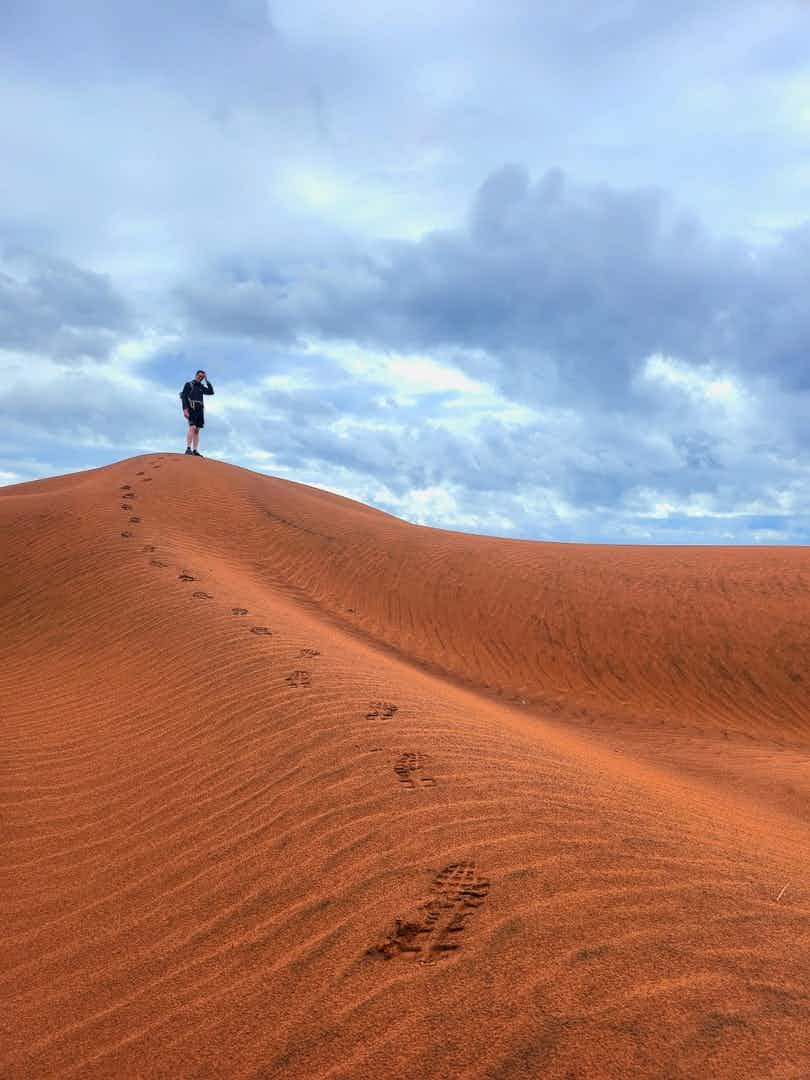
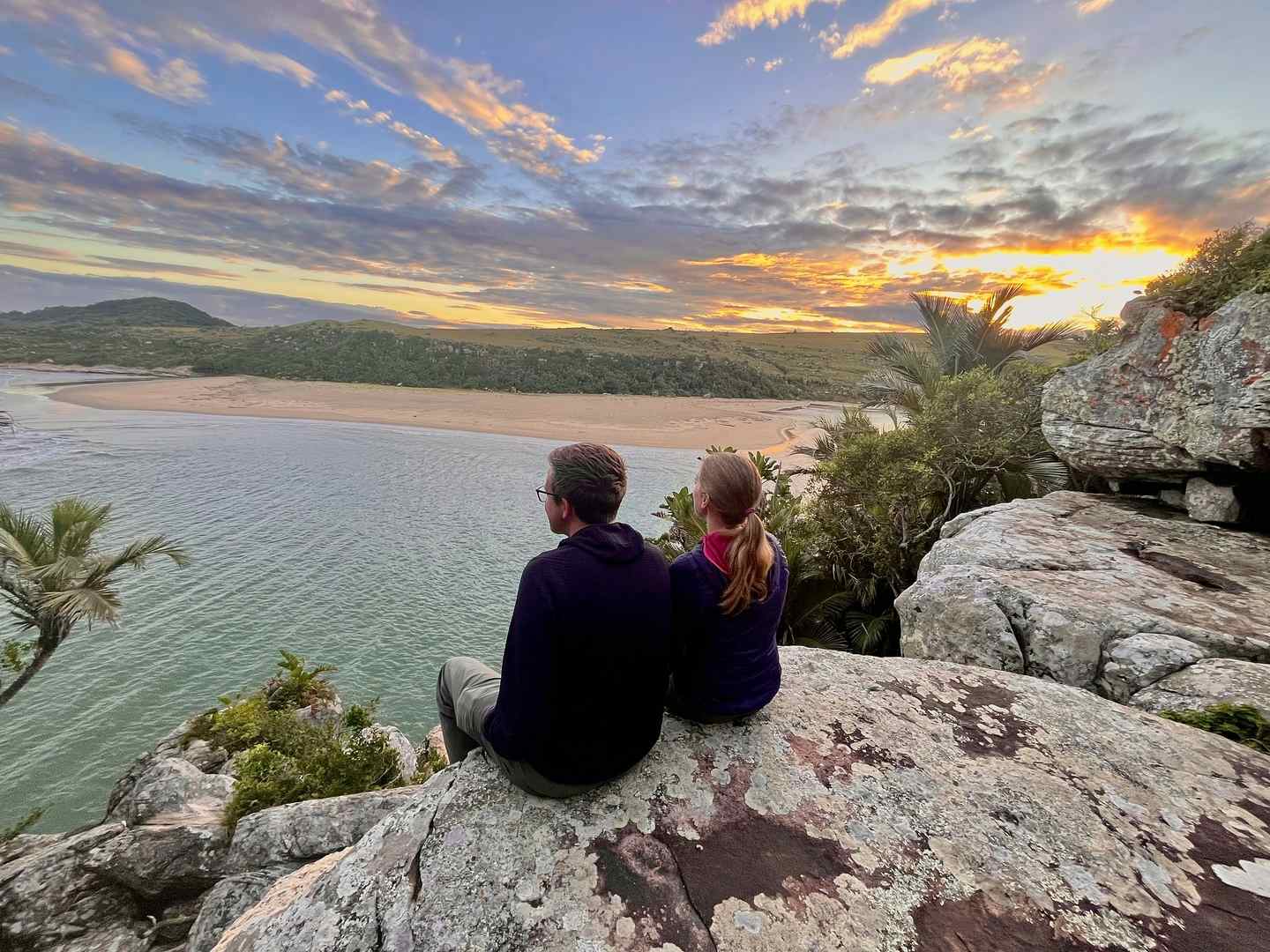
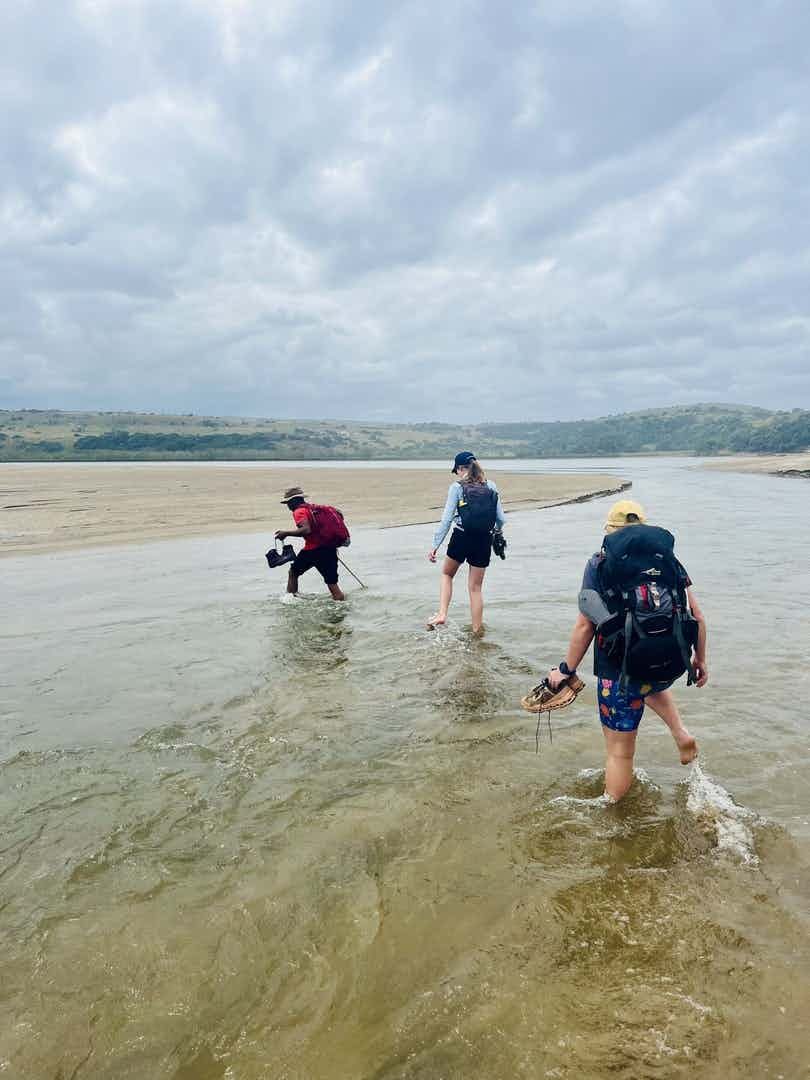
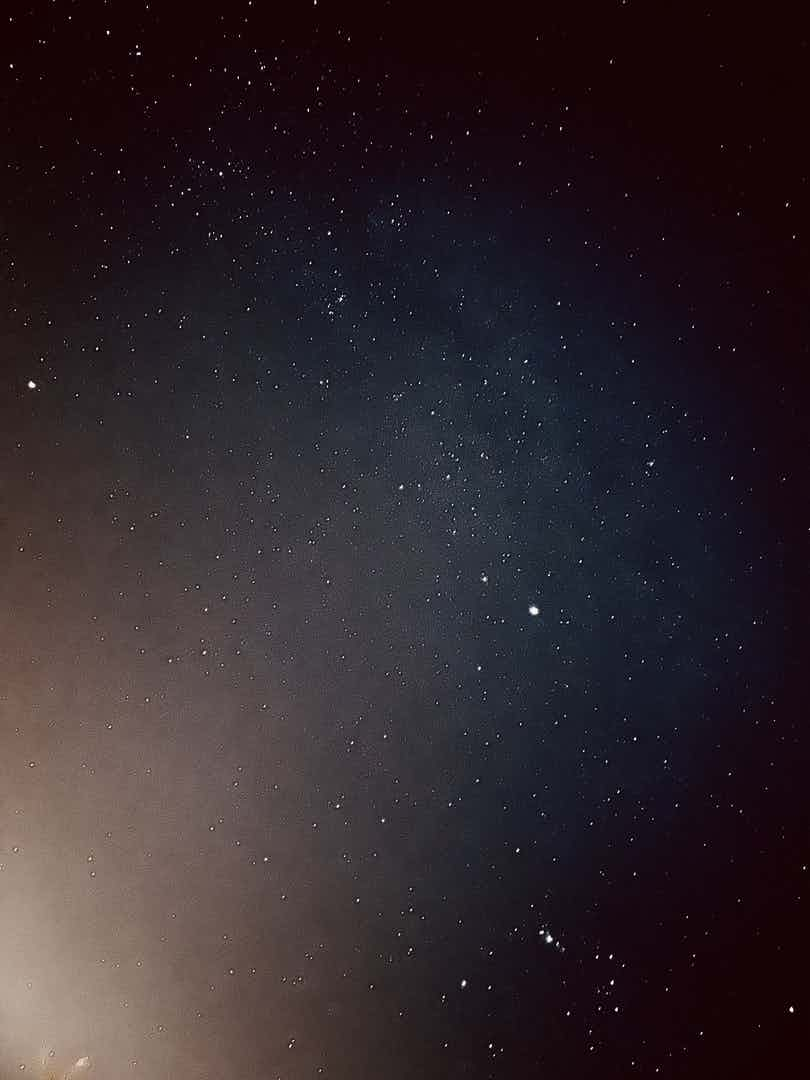
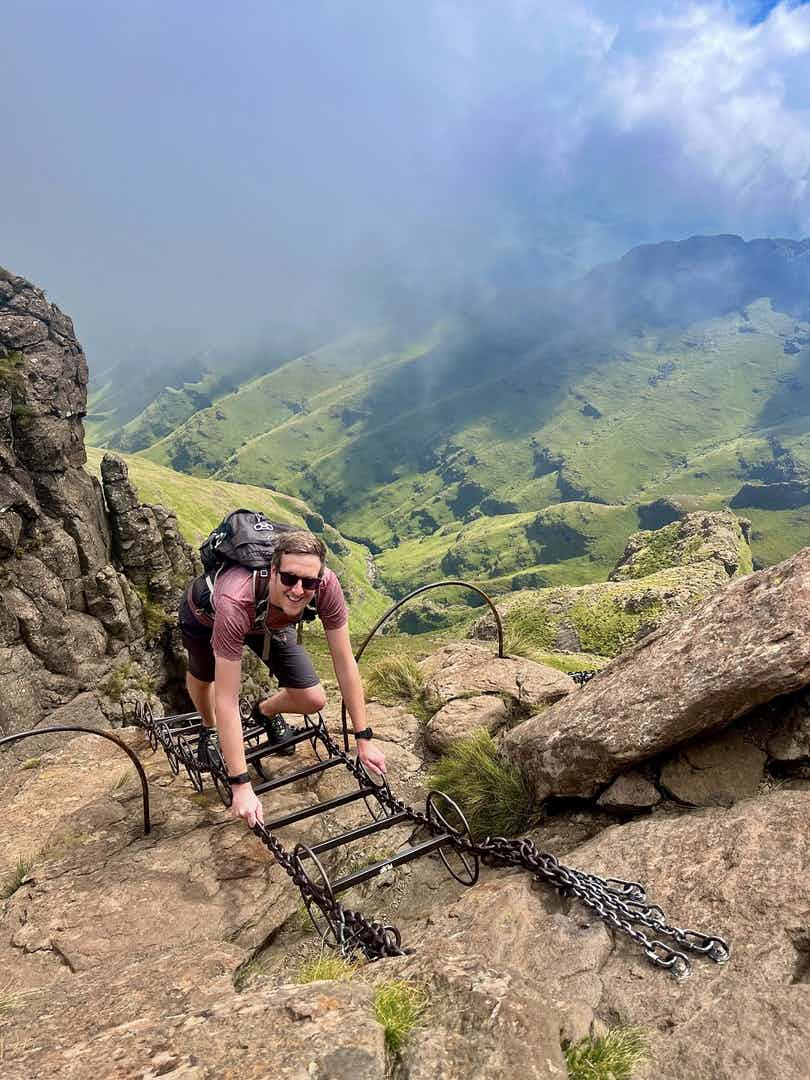
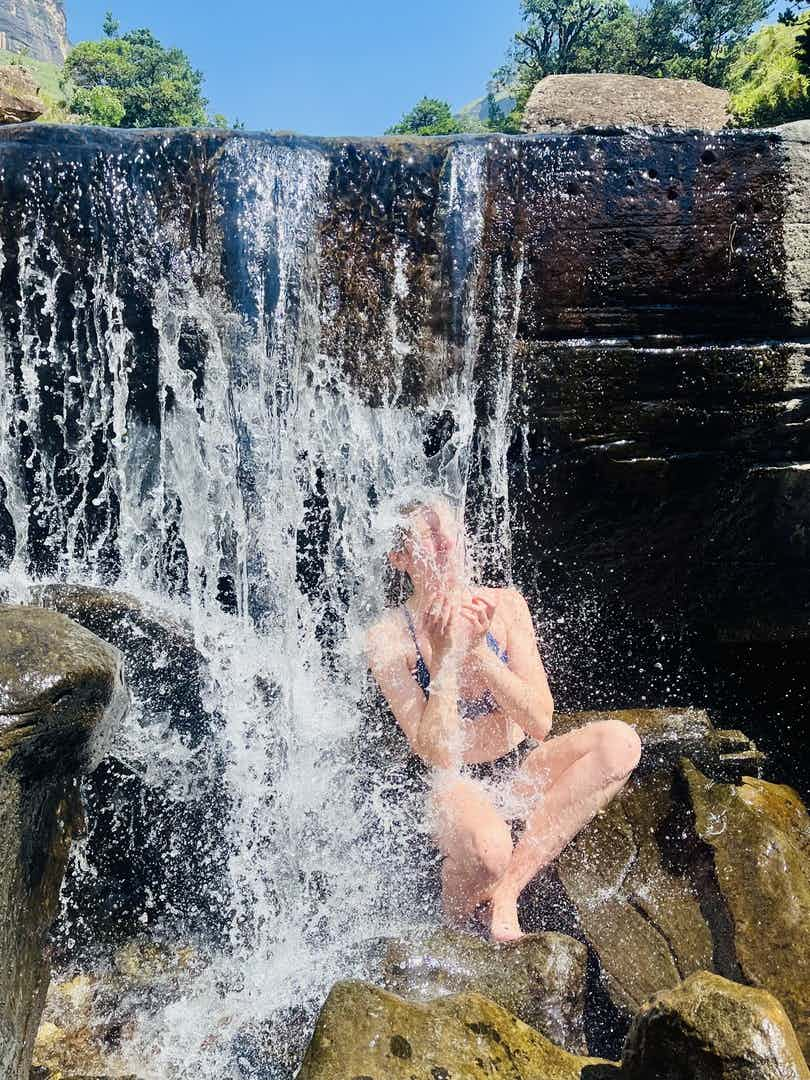
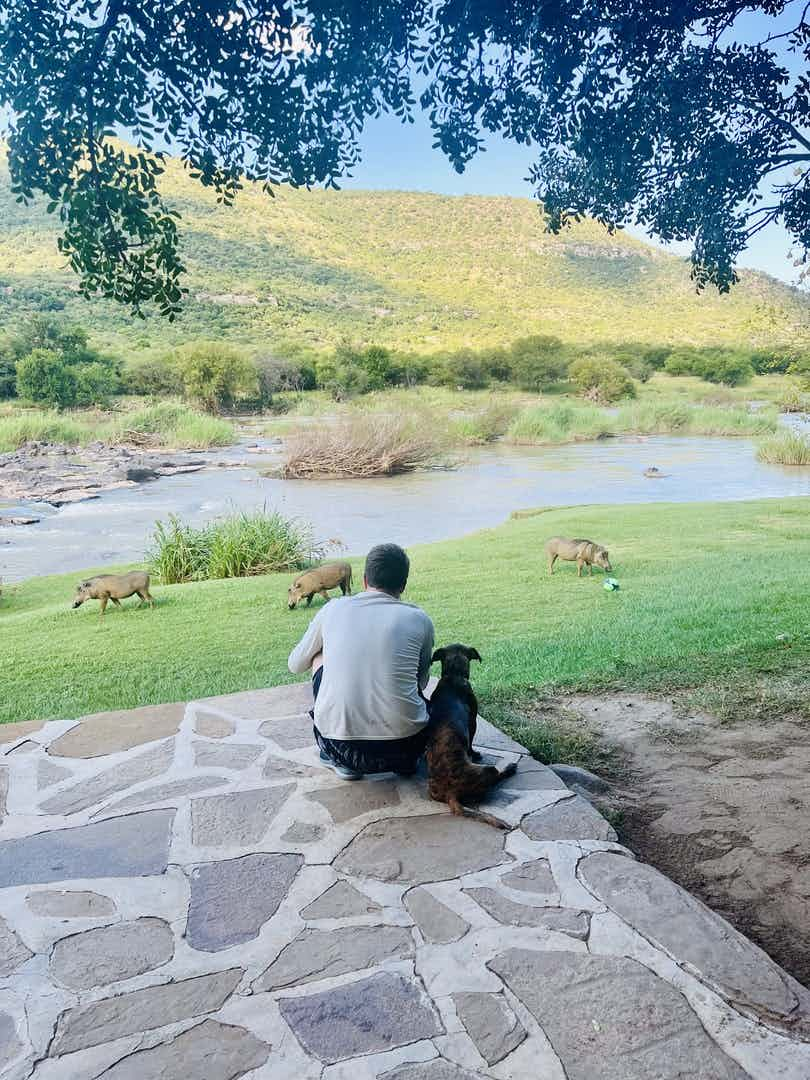
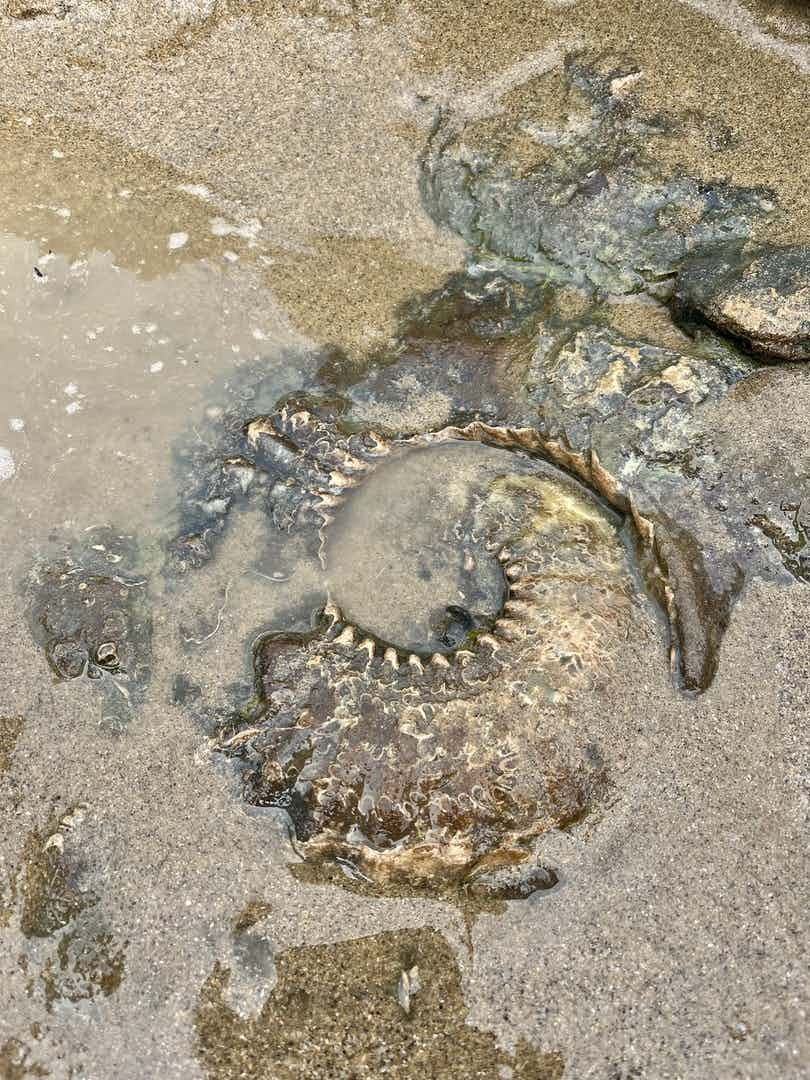
Epic adventure in three parts!
A magnificent adventure that takes you through three different regions of South Africa.
All the accommodations were all amazing, even the homestay had more amenities than we expected - hot shower, proper beds and delicious food. Everywhere catered to my odd allergies and my wife’s vegetarianism too. The first place, The Cavern, was stunning, I wish we had booked a day extra here beforehand to just hangout and play pool or ping pong or lawn bowls or swim! We started our tour with an outdoor yoga/pilates session at the cavern which was a nice way to meet the group and a new addition to the tour - the host Sophie.
The first part of the tour in the Drakensberg mountains was epic; full of dramatic landscapes and a personal highlight of mine - climbing the chain ladders. There’s even a couple of nice refreshing natural pools to cool off in at certain points.
The second part of the tour was at Zingela lodge, a truly special place completely off the beaten track where the tour slows down a little and you get to rest your legs and chill. We also did some fun activities like kayaking and abseiling - I’m scared of the latter but the guide was really good and knew how to keep me calm and got me over and down and I’m thankful that he did. But mostly we just relaxed by the river and played with the dogs here.
The last part of the trip was great too, walking along the copper coloured sand dunes, seeing some huge fossils on the beach but my favourite part of this section was the last day when we kayaked up the river and did a short hike/scrambled to some hidden waterfalls where we could literally jump in the water and swim and bask in the sun.
All the local guides were knowledgeable on local flora and fauna and gave us insight into the local communities too.
Highly recommended. An unforgettable experience.
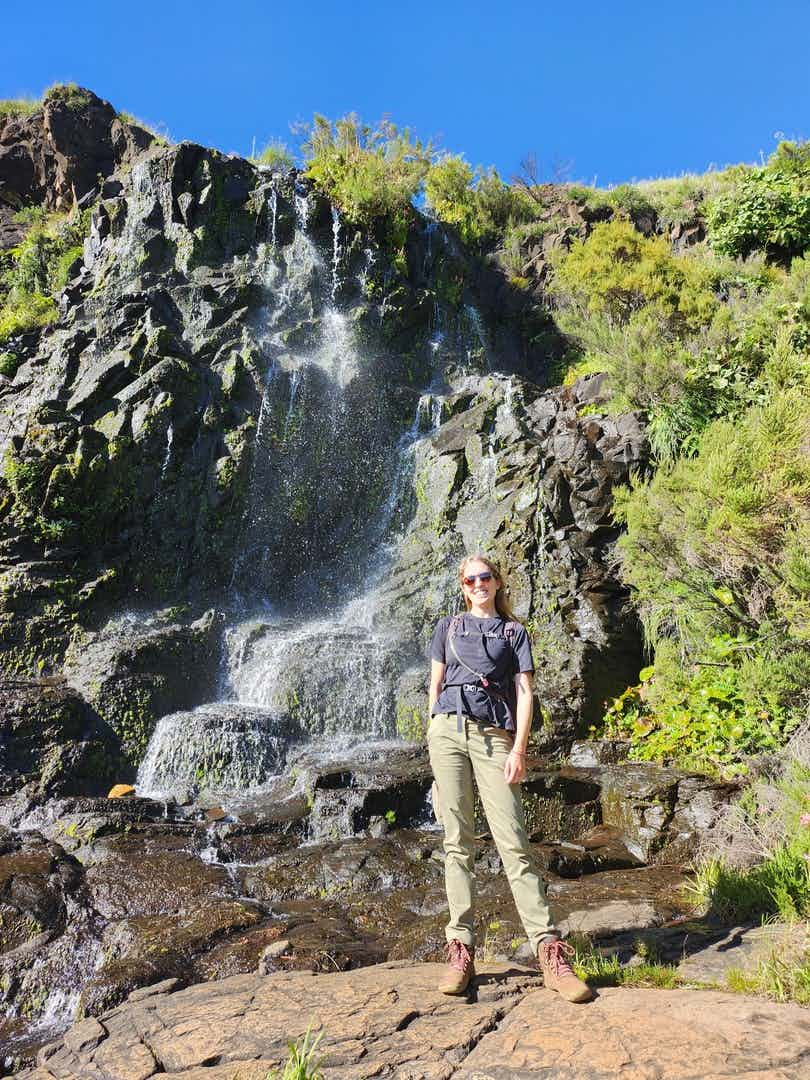
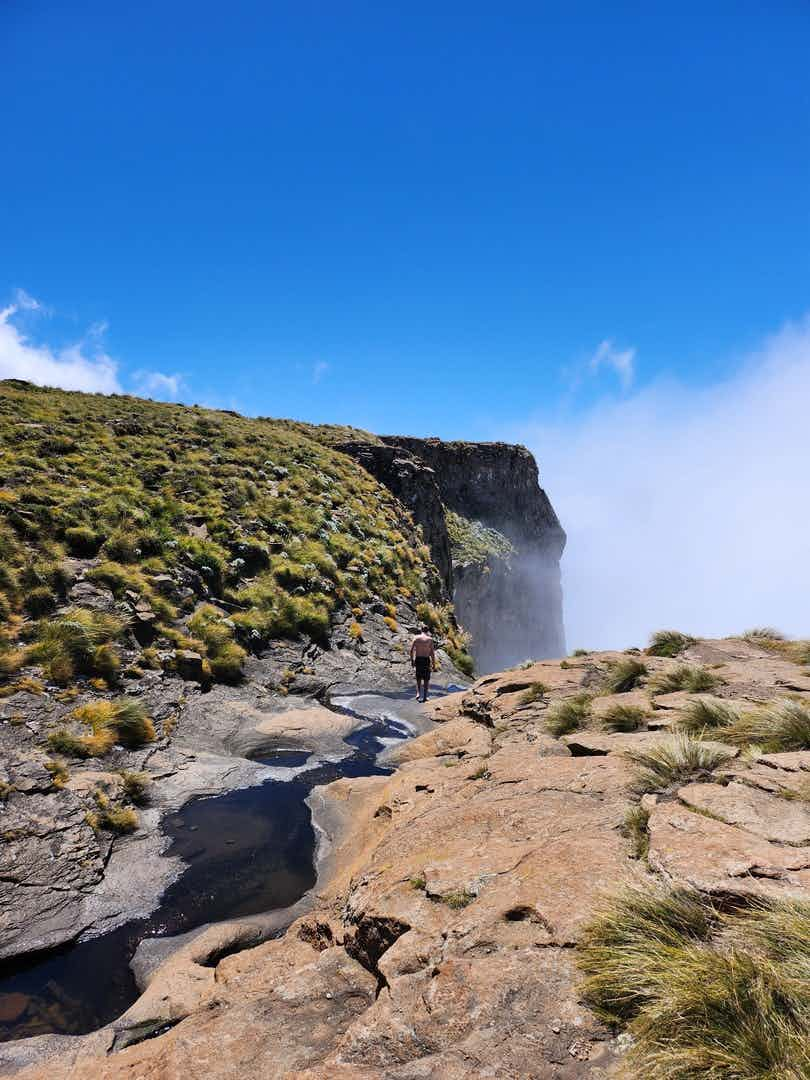
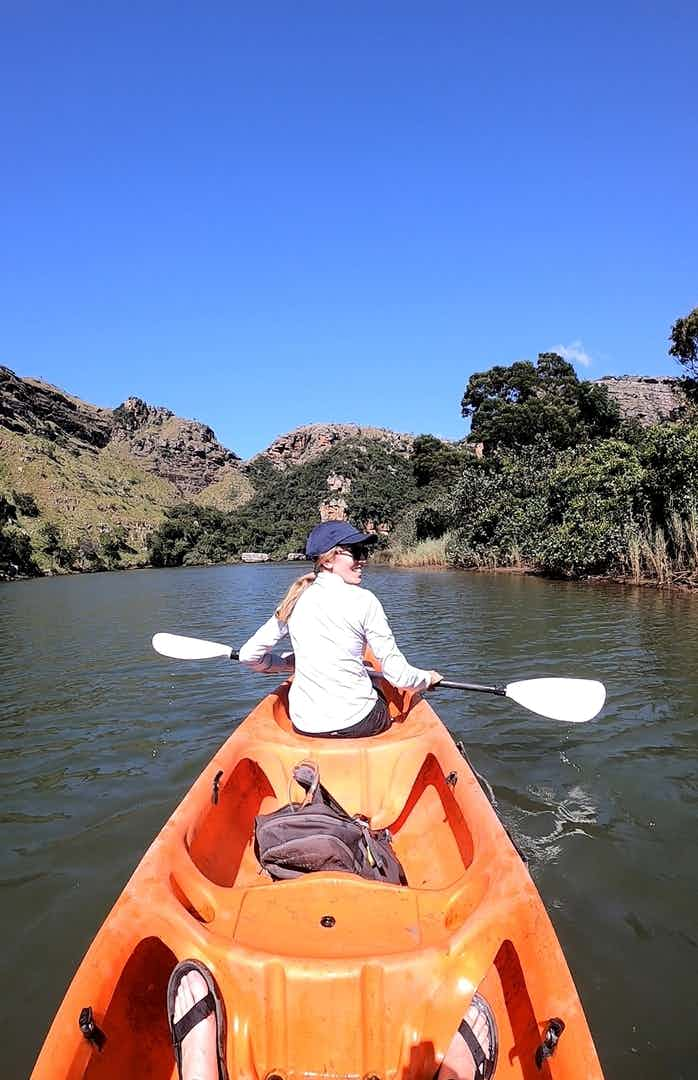
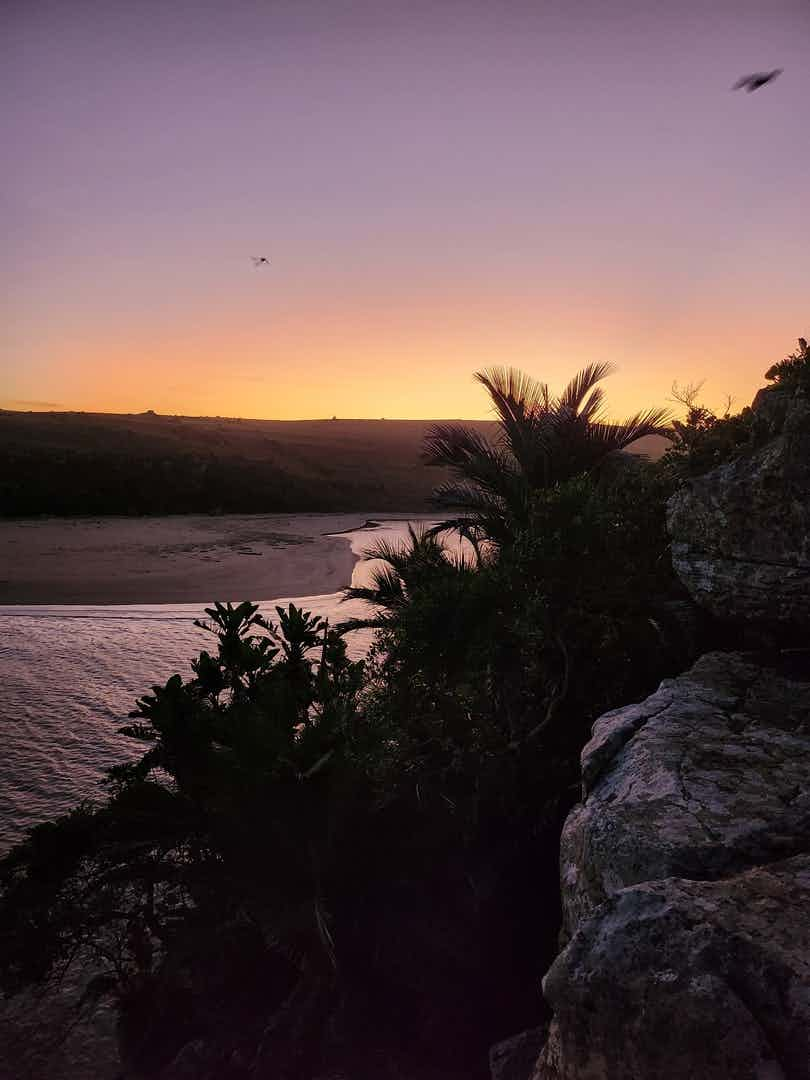
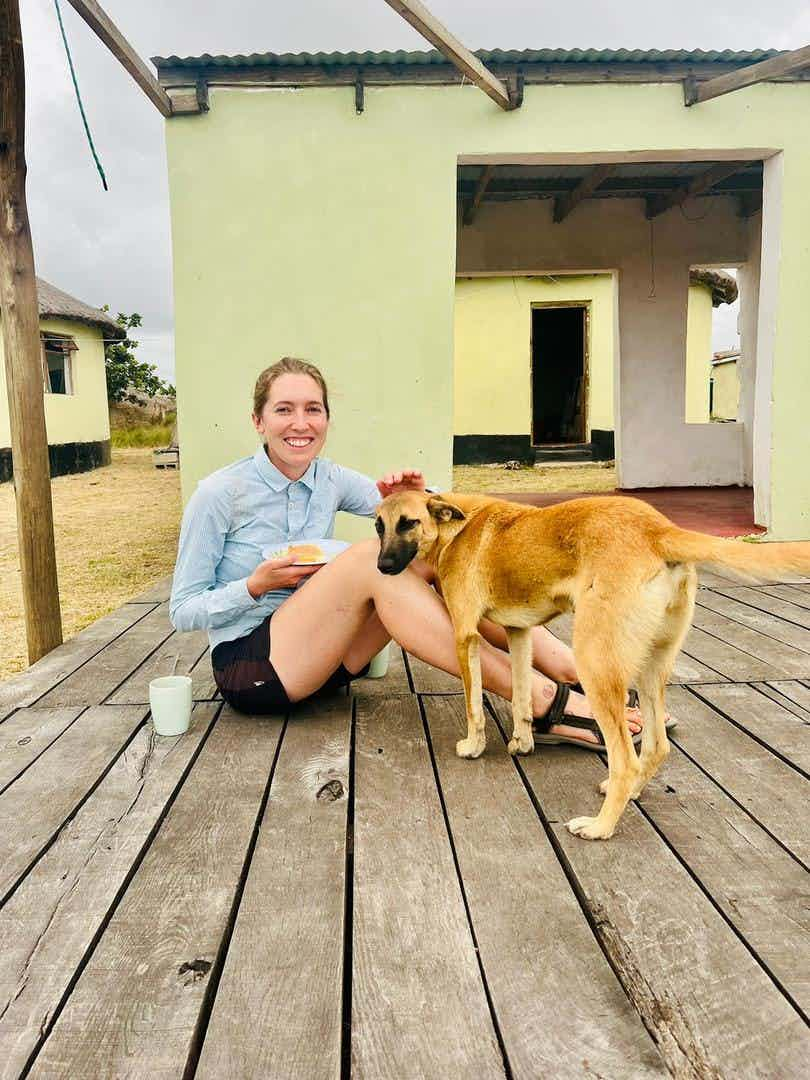
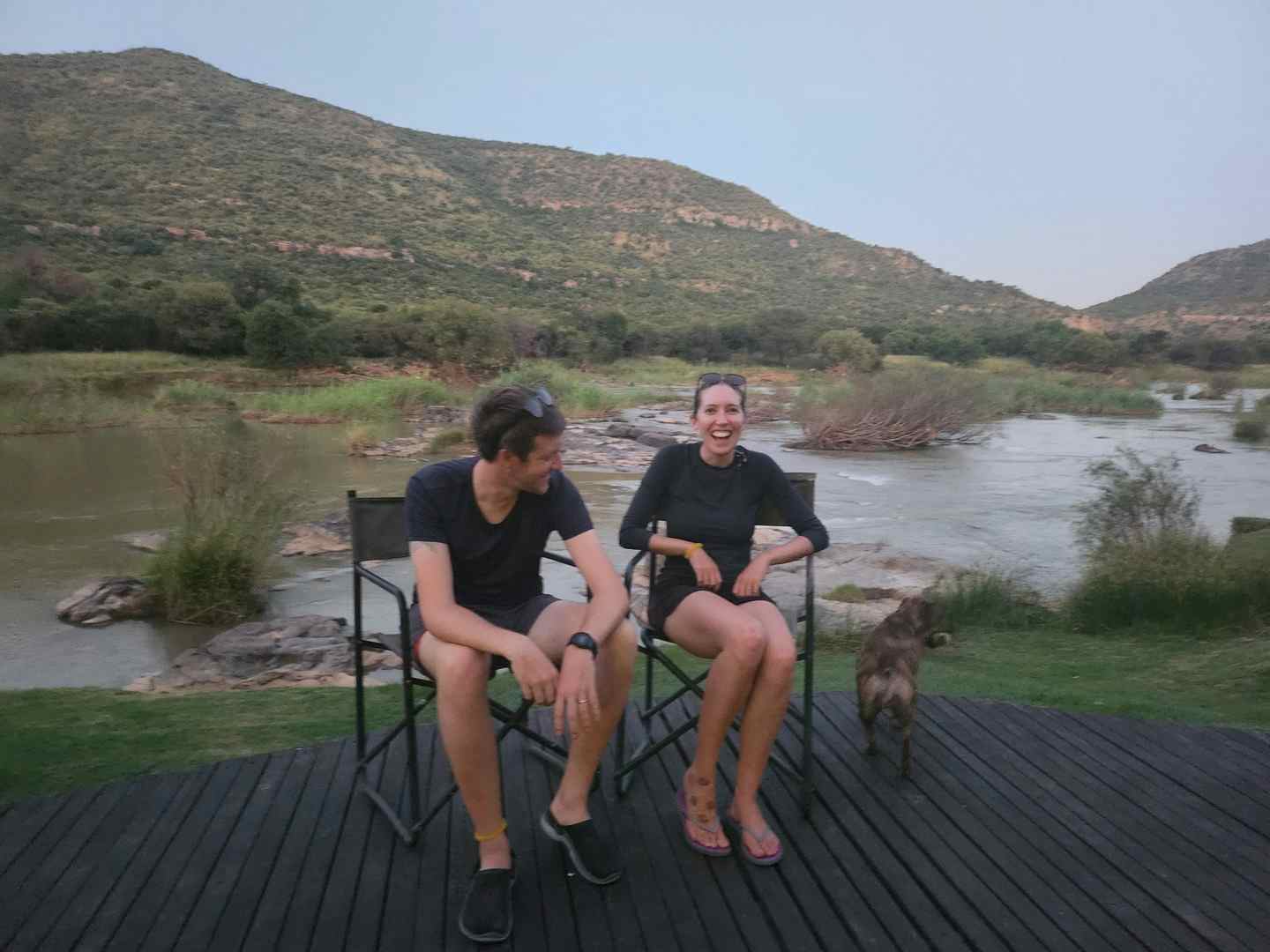
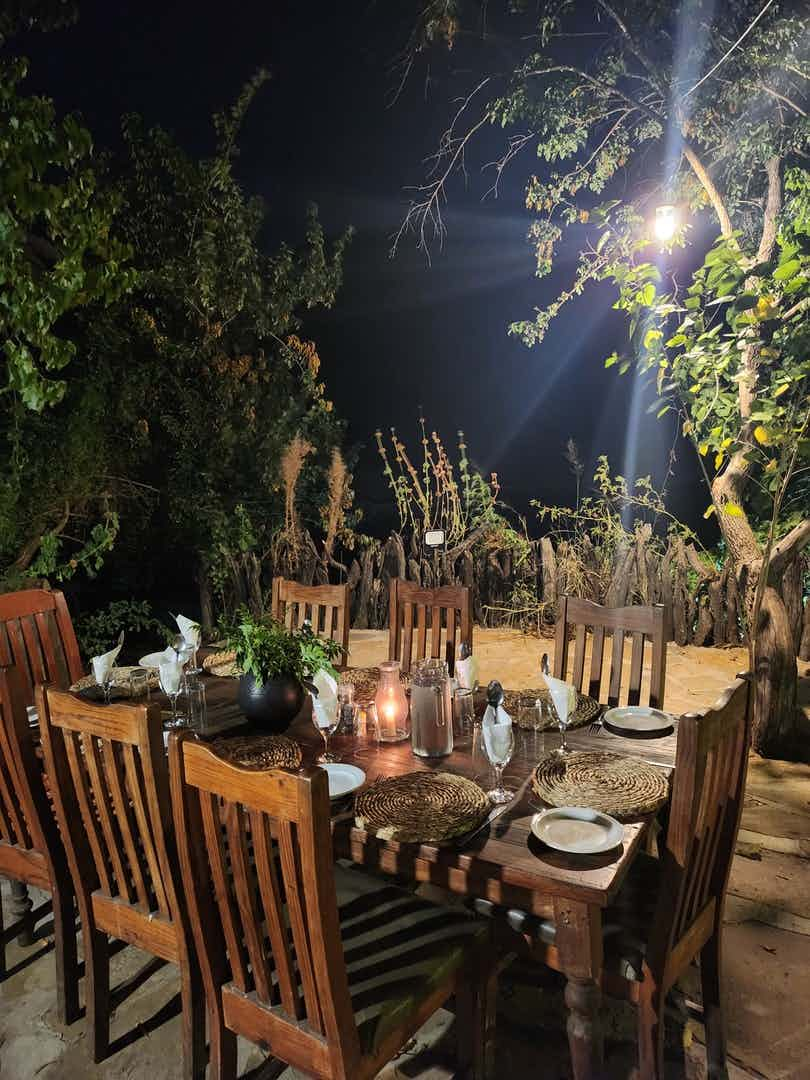
This is a perfect combination
This is a perfect combination of active days exploring off the tourist trail and then ending with cosy, chilled evenings where you can chat, read, and somedays we even did sunset pilates/yoga before drinks and dinner by the fire.
It's three adventures in one tour, giving you a taster of various landscapes. Hiking the Drakensberg Mountains, followed with days by the lake in the bush being as active (rafting, abseiling, swim, hike) or chilled as you want, then ending by the coast hiking and kayaking properly off the beaten path. I loved hiking these routes and dipping into cool pools of water to refresh the feet and legs.
I was blown away each day arriving at our next accommodation. They were all so special and have been hand picked, each one felt like a secret gem on our travels.
Some days we had a local guide with us who gave us a great insight into the area, local communities, the plants and wildlife. Our host Sophie was also with us throughout the tour and provided us with kit bag suggestions, timings, and making the whole thing run smoothly.
A bonus was as we were exploring South Africa we came across plenty of wildlife including baboon, warthog, giraffe, impala, dassie (very cute) and loads of birds.
Definitely book this tour if you want to experience a different side of South Africa that is very much undiscovered.
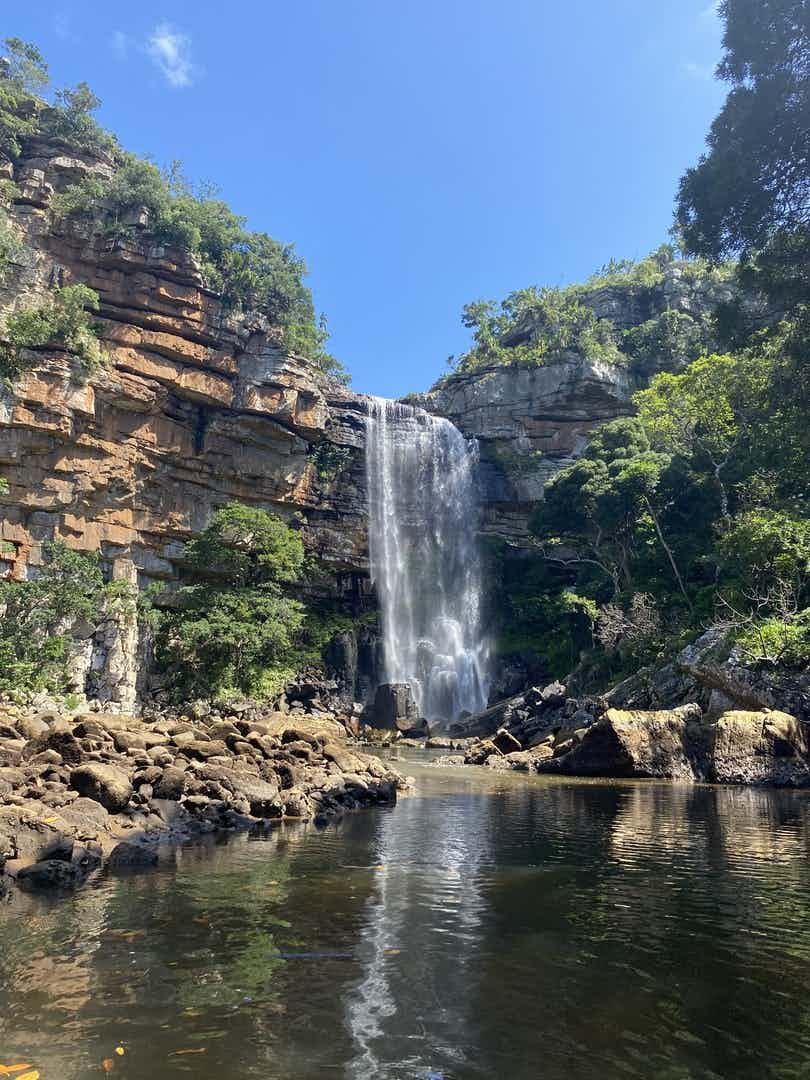
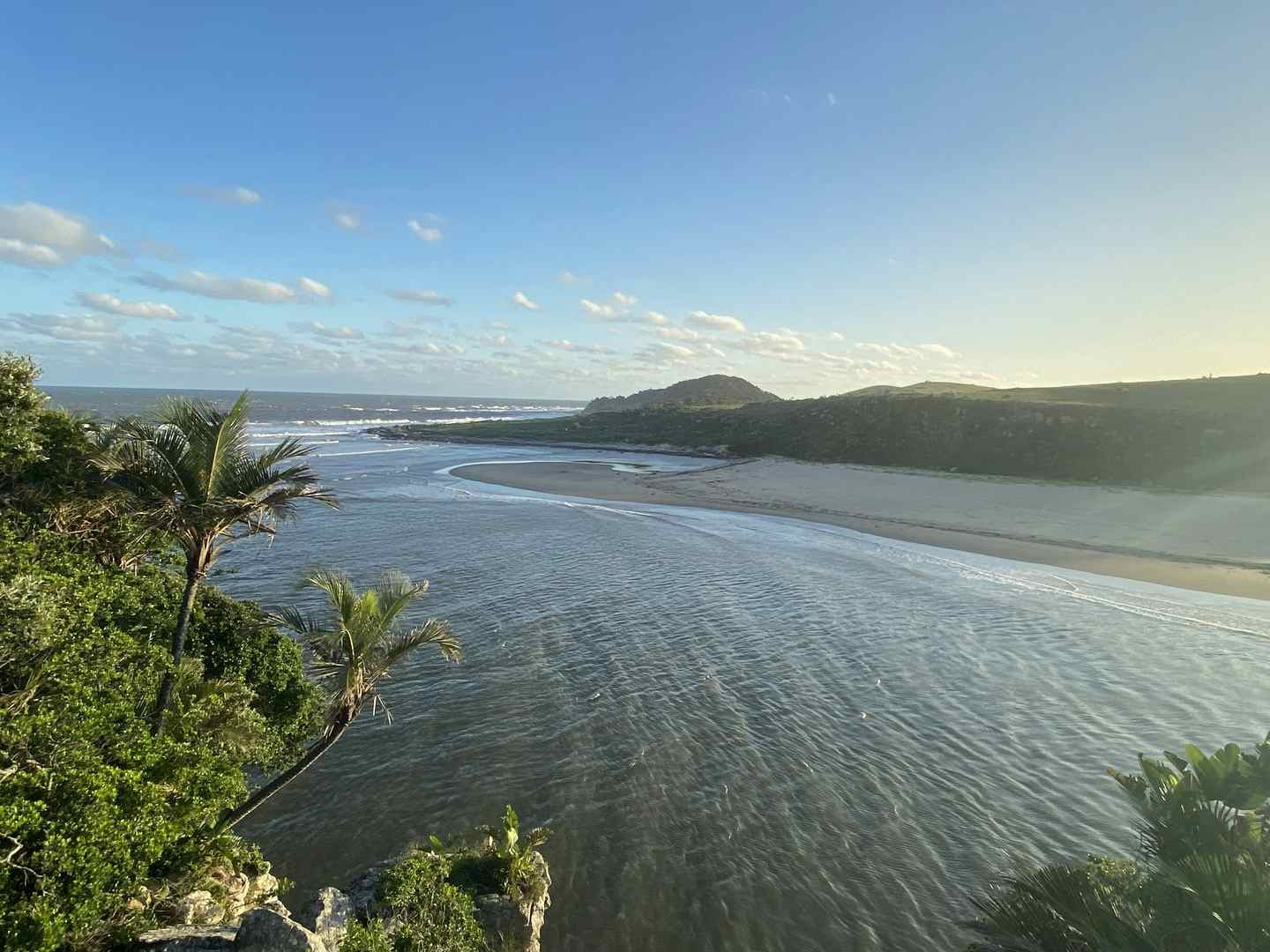
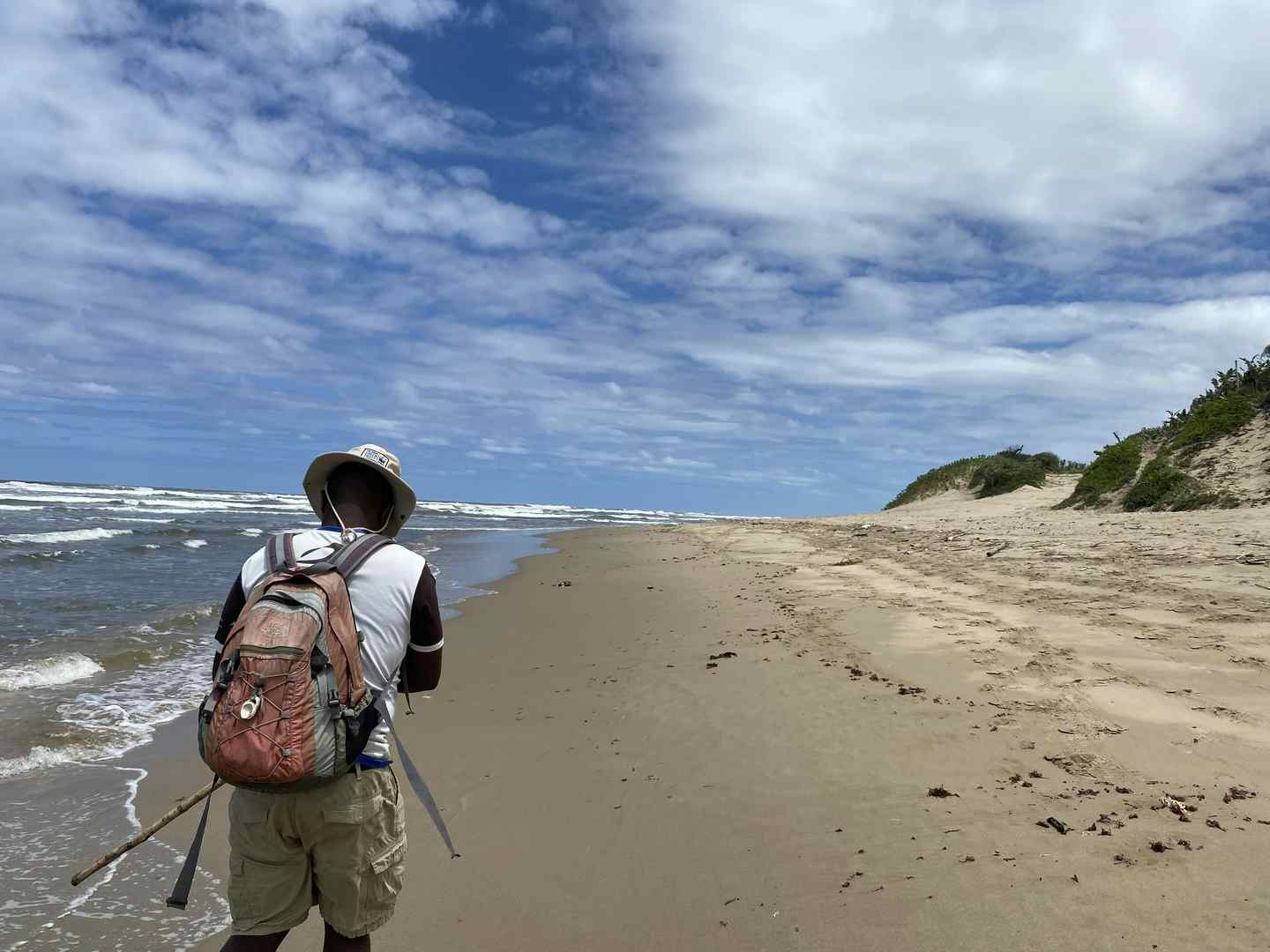
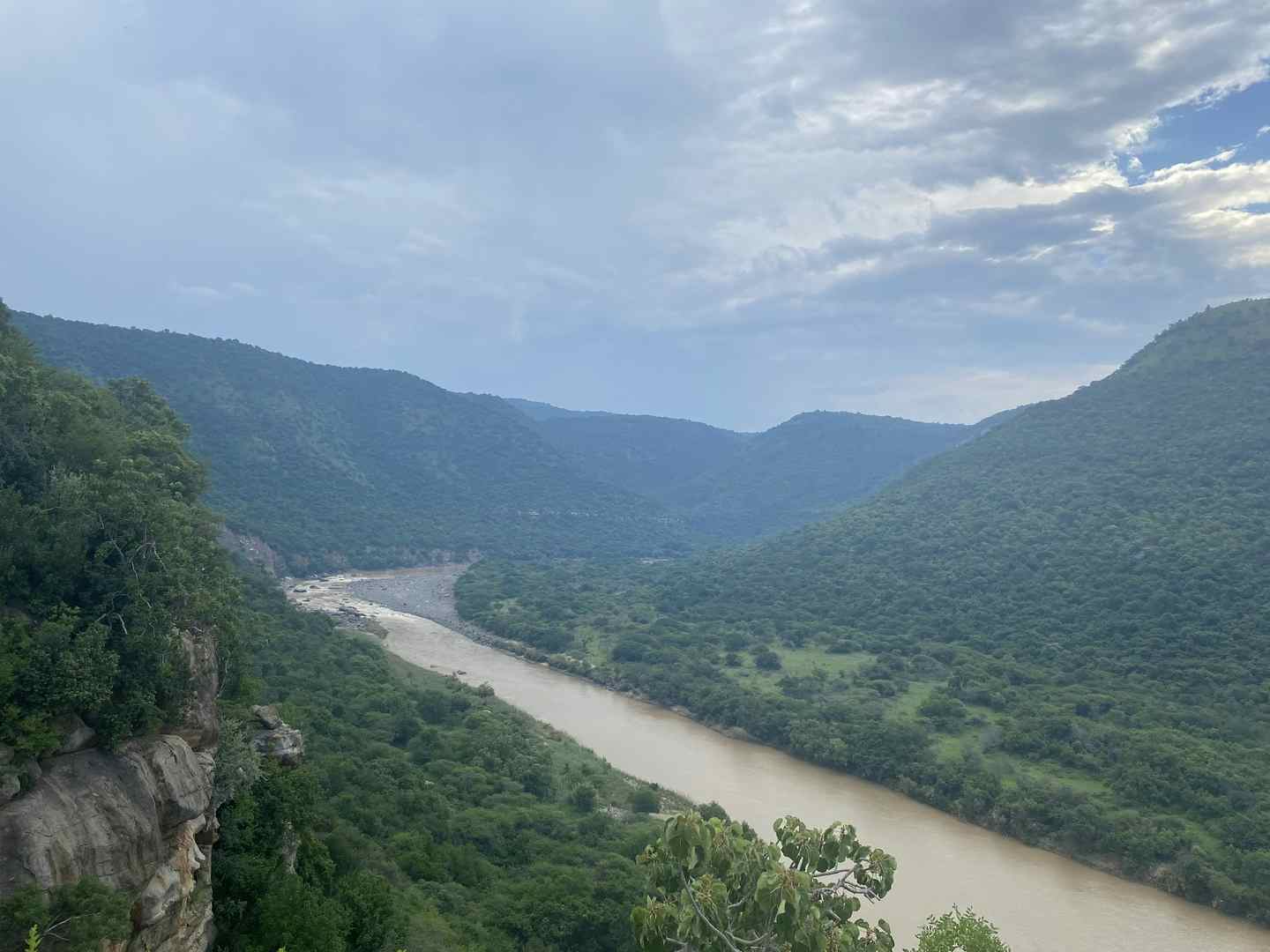
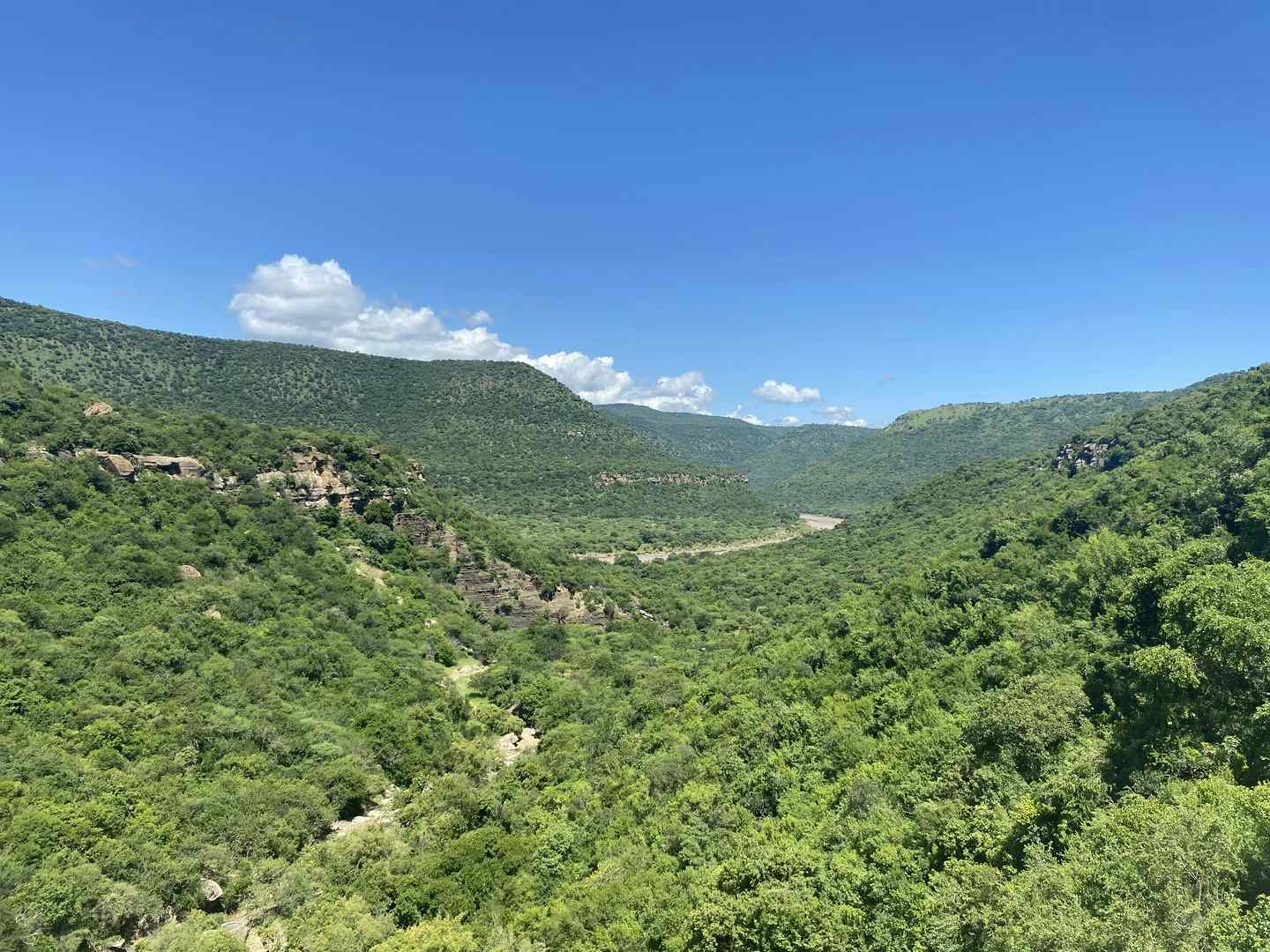
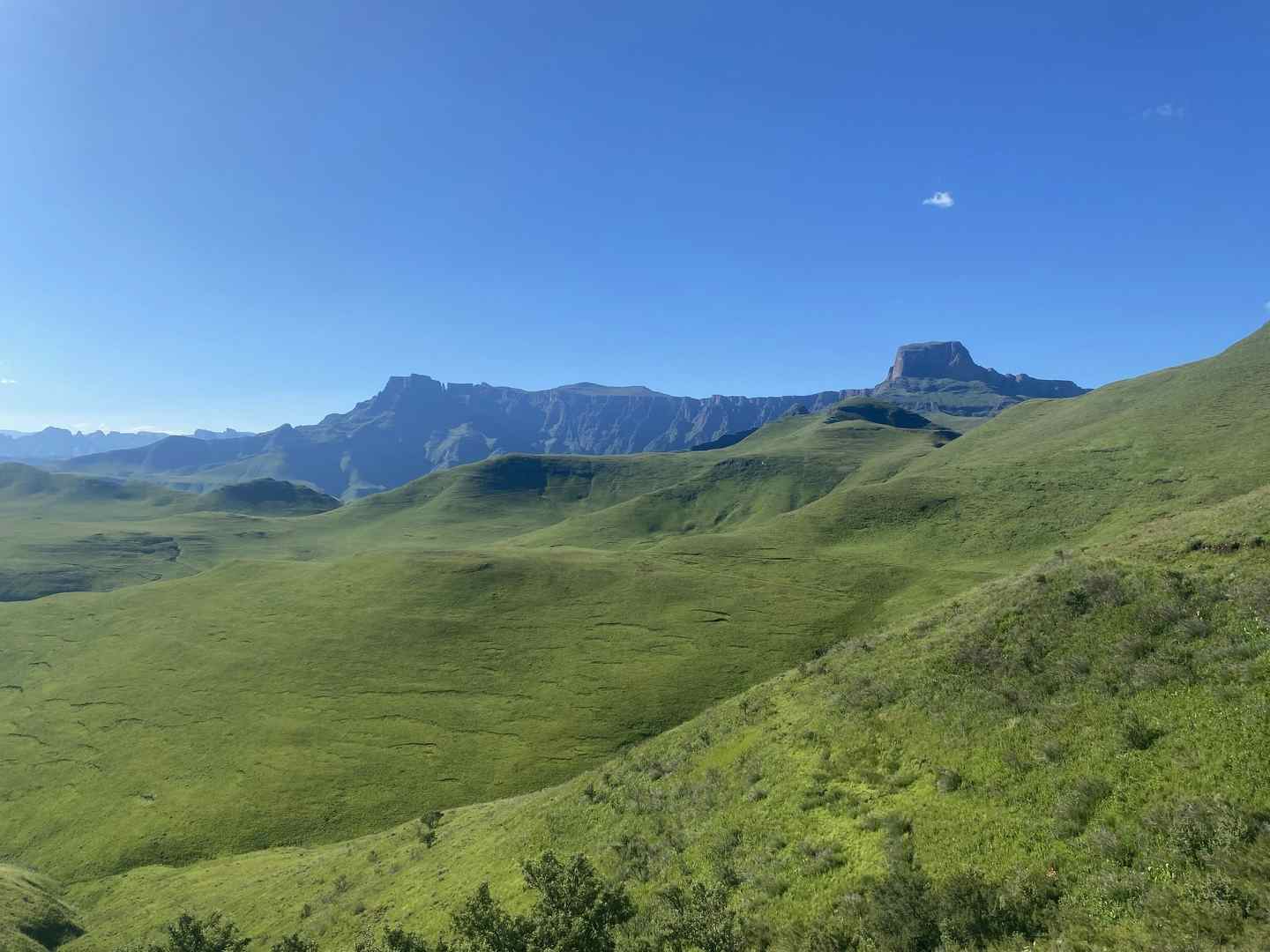
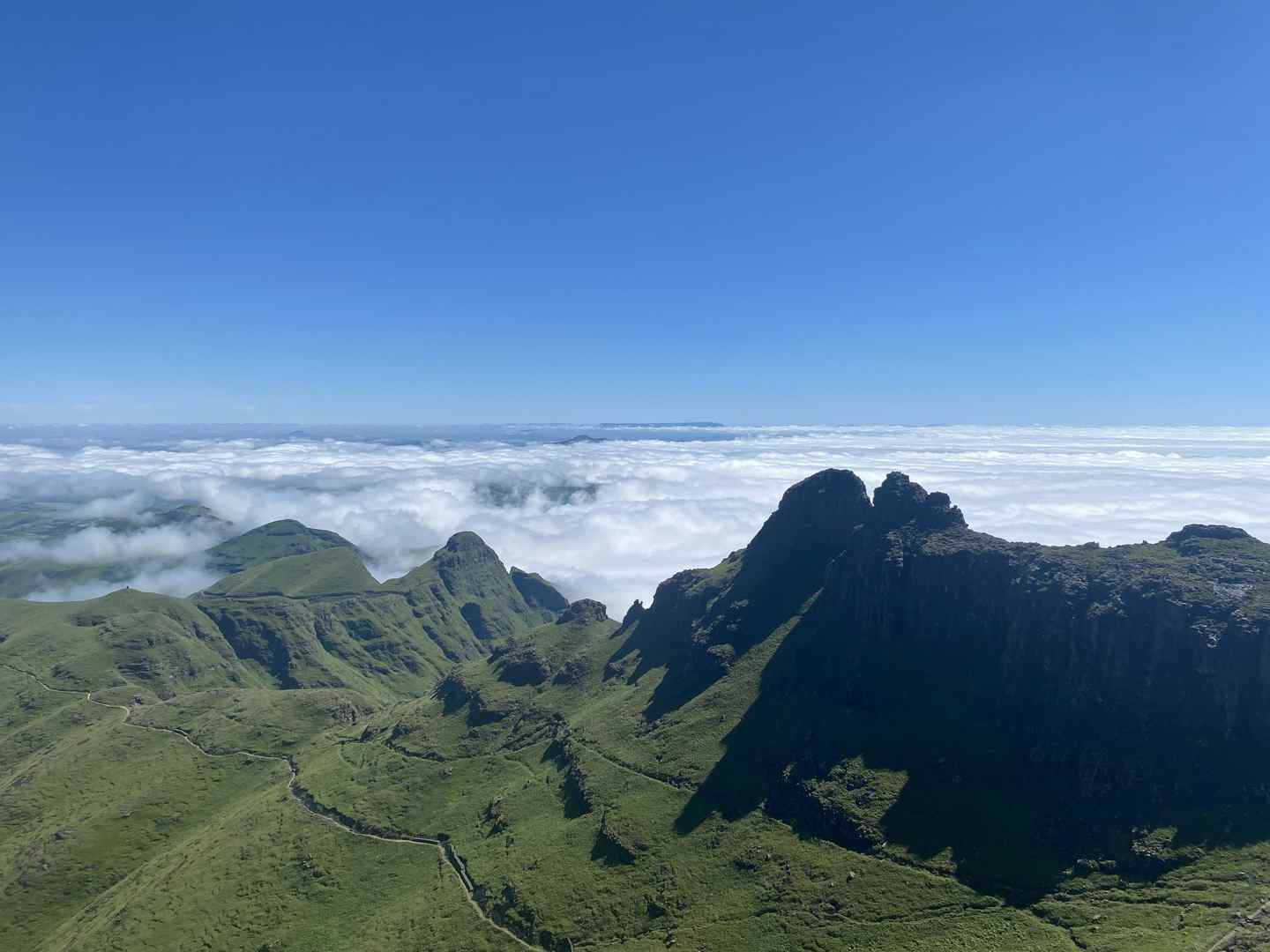
Loved this trip - stunning scenery!
This trip was spectacular, it was so good I just wished it was longer!
The trip is broken down into 3 parts and each a different landscape and all wonderful. The hiking in the Drakensberg mountains was stunning, the Tugela River section was very different scenery but allowed a couple of days of more chilled activities. And the best bit probably was the Wild Coast and Mtentu Lodge....our guide Siya was also brilliant, the scenery especially on the second day was incredible, some beautiful waterfalls and swimming spots, and the food at the homestay and lodge was great too.
It's rated accurately - we were all fit hikers and no day was too tough hiking wise. You do find you set off early and make it to lodges for early afternoon so make sure to pack a book / kindle.
This was my first MBA trip, so I didn't notice the lack of "host". I found the guides and drivers all showed up where they needed to be and everything was very organised, so no problems doing it without one host all week.
The pack list is pretty accurate - you do have to carry your own stuff for a few days, so you learn to be good at packing / repacking bags!
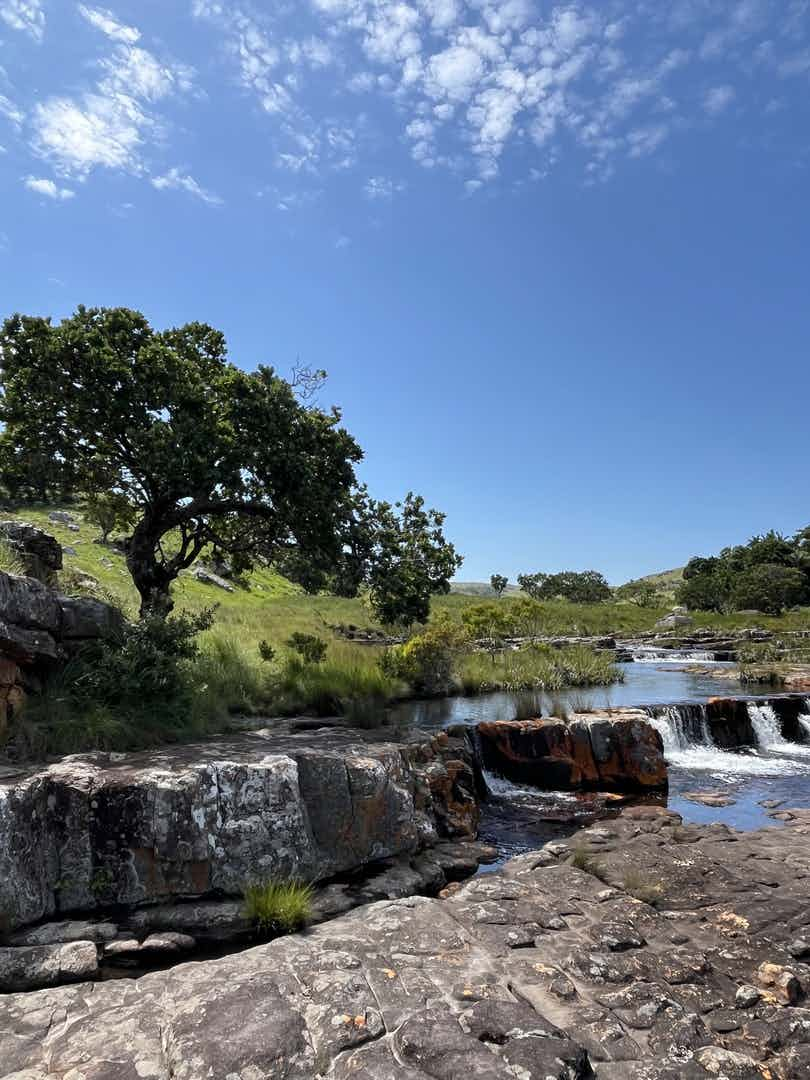
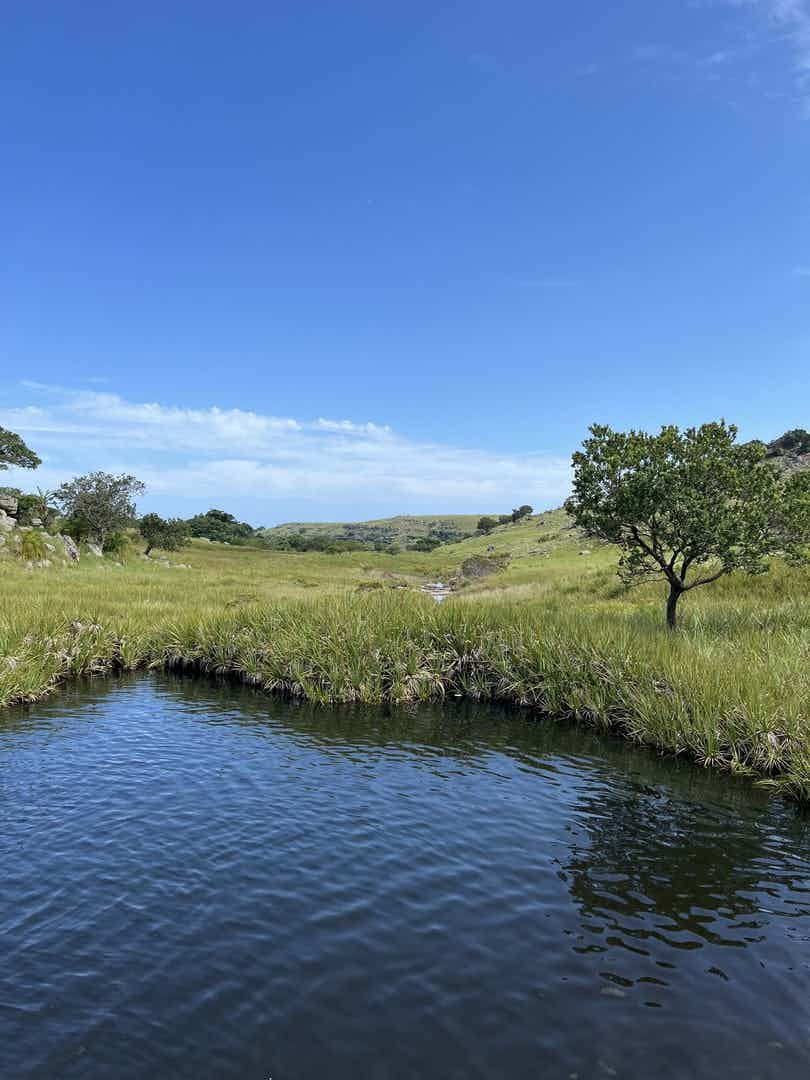
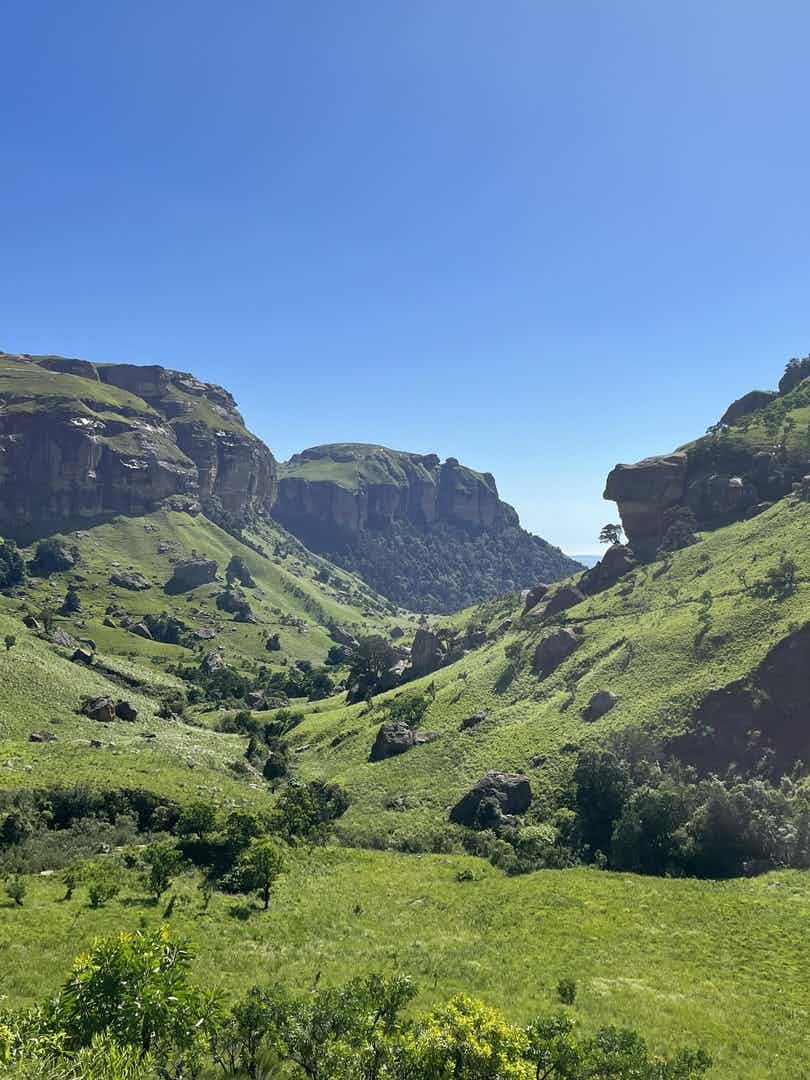
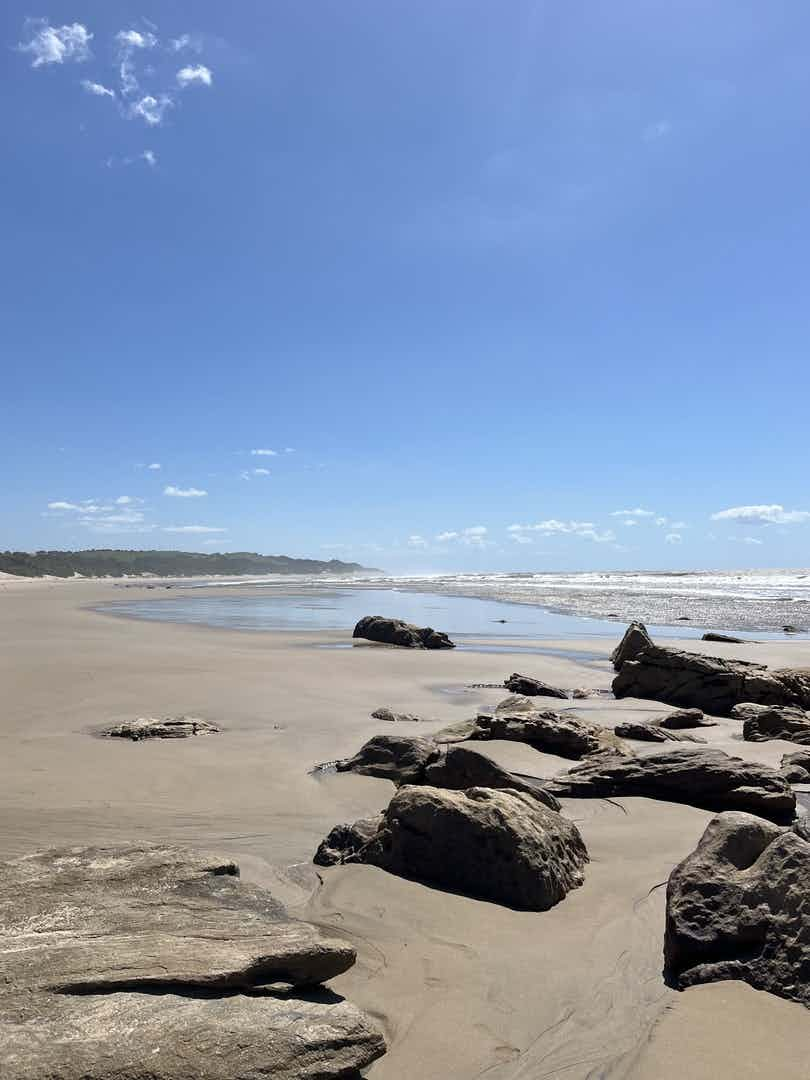
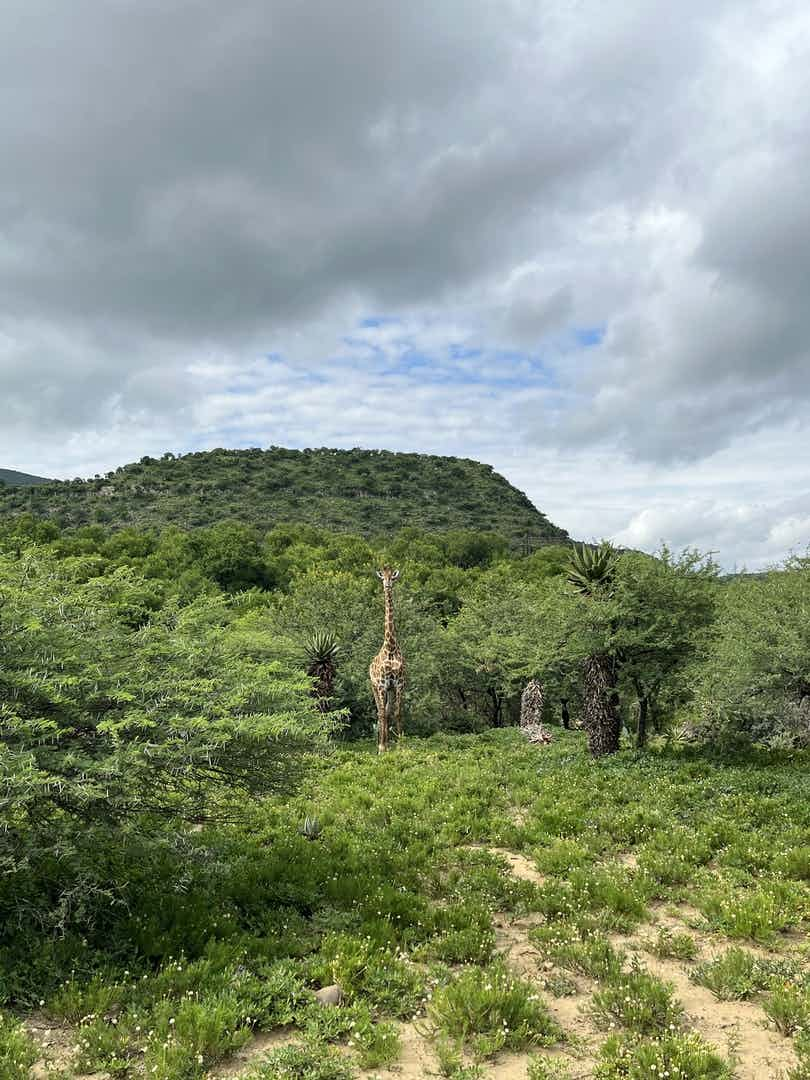
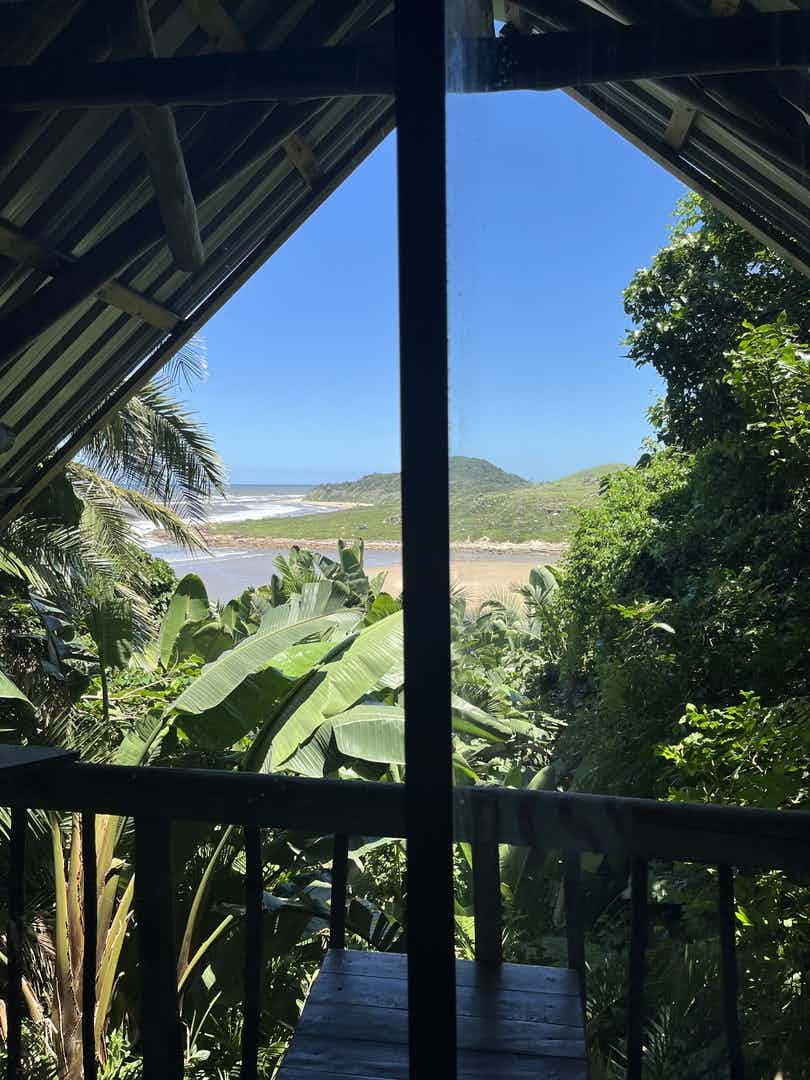
This was a really fun
This was a really fun and varied trip, and I had a fantastic time!
The itinerary is basically split into mountains, river and coast, and I loved all three parts. The Drakensberg mountains were spectacular. The accommodation on the Tugela River was fantastic and the food was amazing there. However, I enjoyed the homestay and Mtentu the most, as I haven’t done much hiking on the beach before. Very tiring on the sand but rewarding! The scenery surrounding the lodge is stunning. We did rafting on the Tugela, which was very fun. Even saw loads of giraffe in the surrounding unfenced reserve, which I wasn’t expecting from the trip!
One thing to be aware of is that unlike some other MBA trips, there is a remote host for the overall trip, and you’re greeted by different onsite guides throughout the experience. This isn’t a problem. They were all lovely, especially Siya at Mtentu. All the transfers ran smoothly, and the trip is very well organised.
A few other things to know beforehand! The transport to Zingela is an open-topped jeep for about a hour and a half in the heat of the day. Also be aware you have to carry a pack for 2 days in the Drakensberg, and another pack for 3 days on the wild coast, otherwise all the luggage is transported. This is outlined in the trip info. In hindsight, I’d have brought a mosquito net for the lodge. And pack plenty of sunscreen if you’re going in summer. More than you think you’ll need!
Overall, a really active and enjoyable trip. Prepare to be exhausted and super fulfilled all at once. Thank you, Sarah, and team, for a wonderful experience in South Africa.
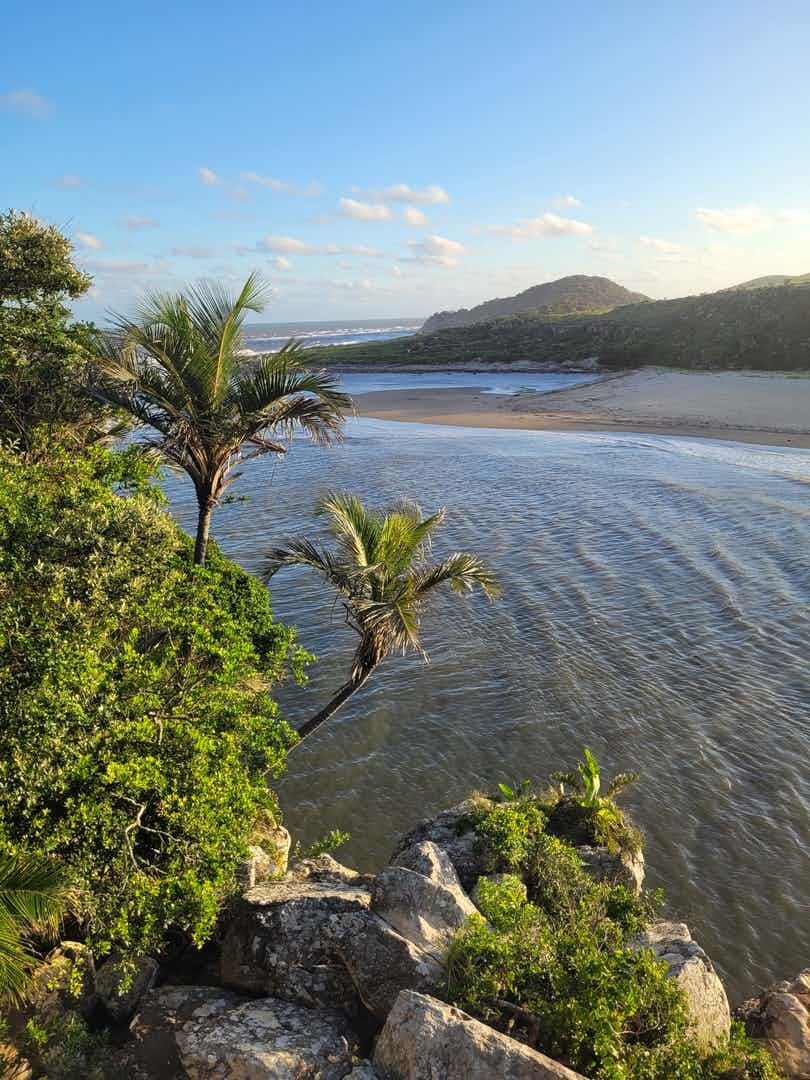
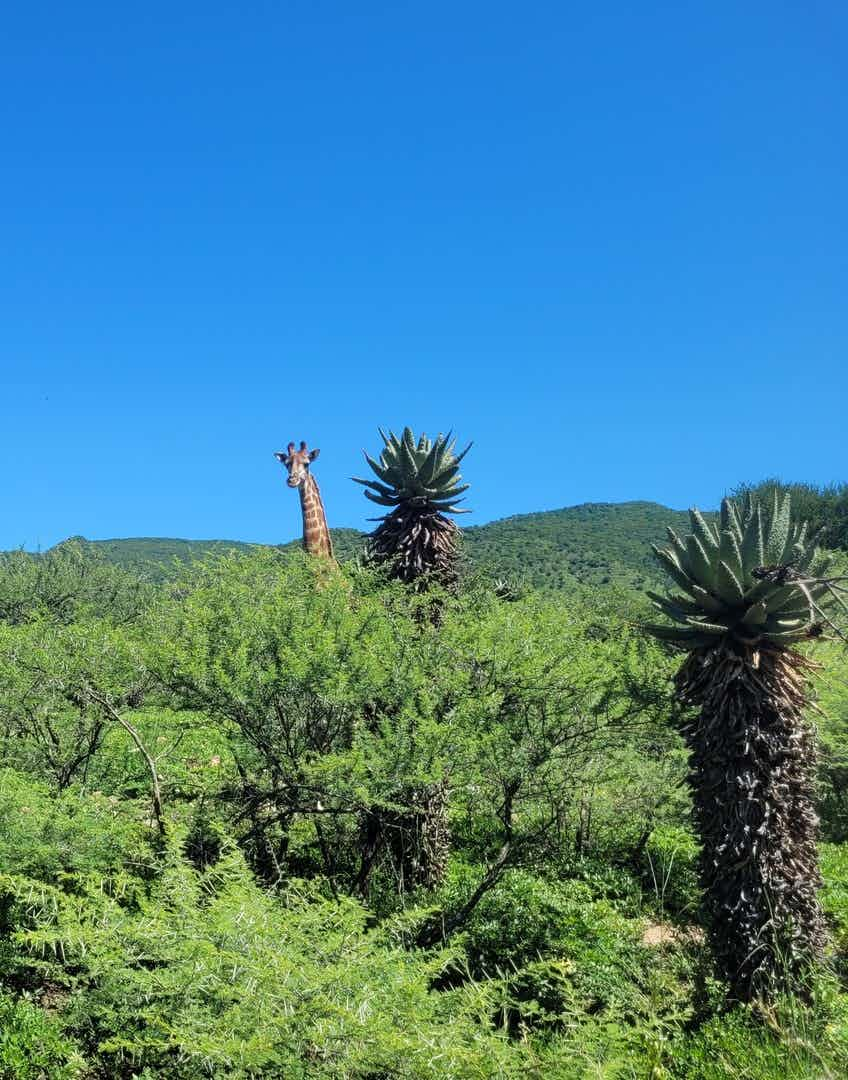
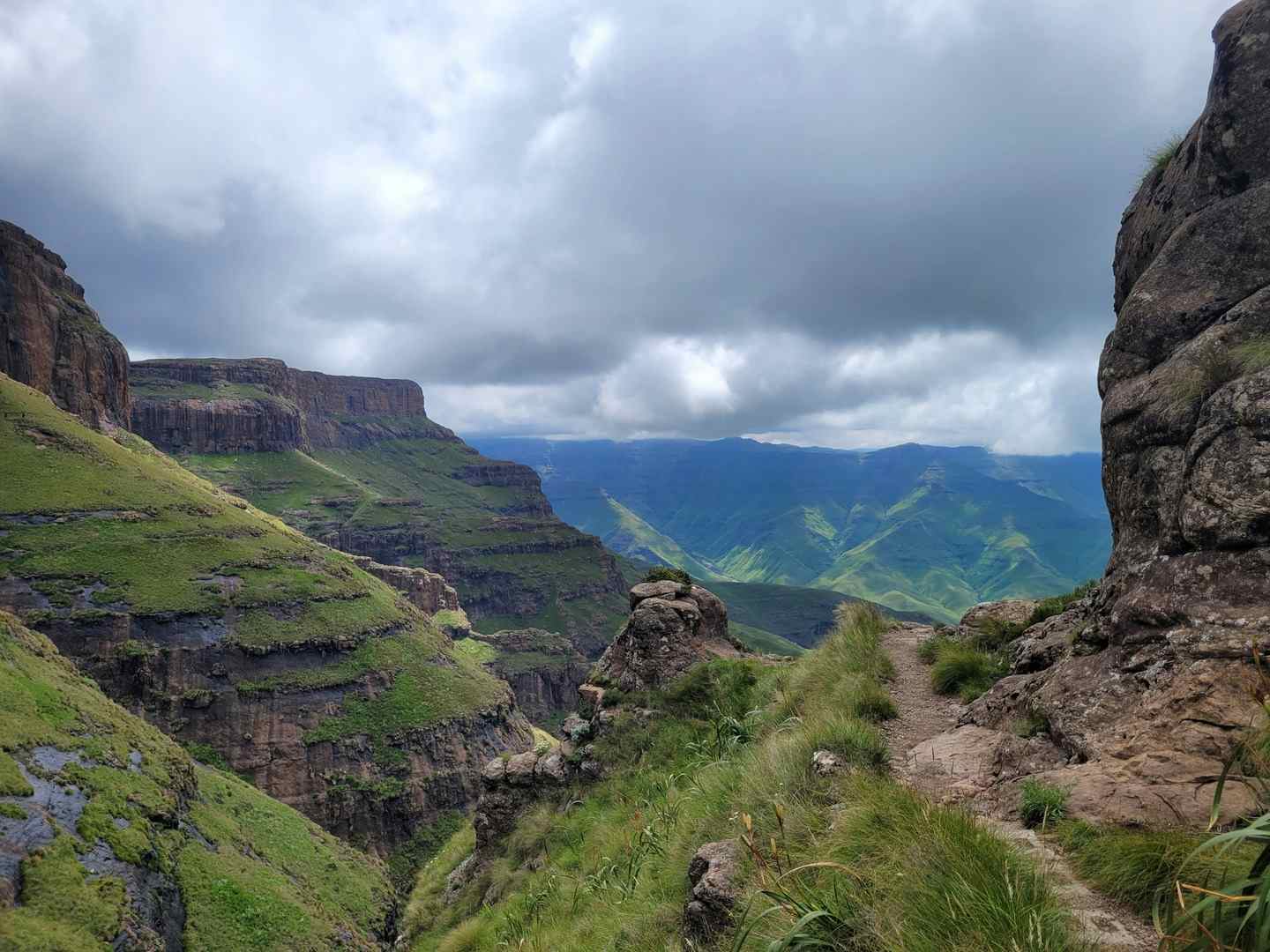
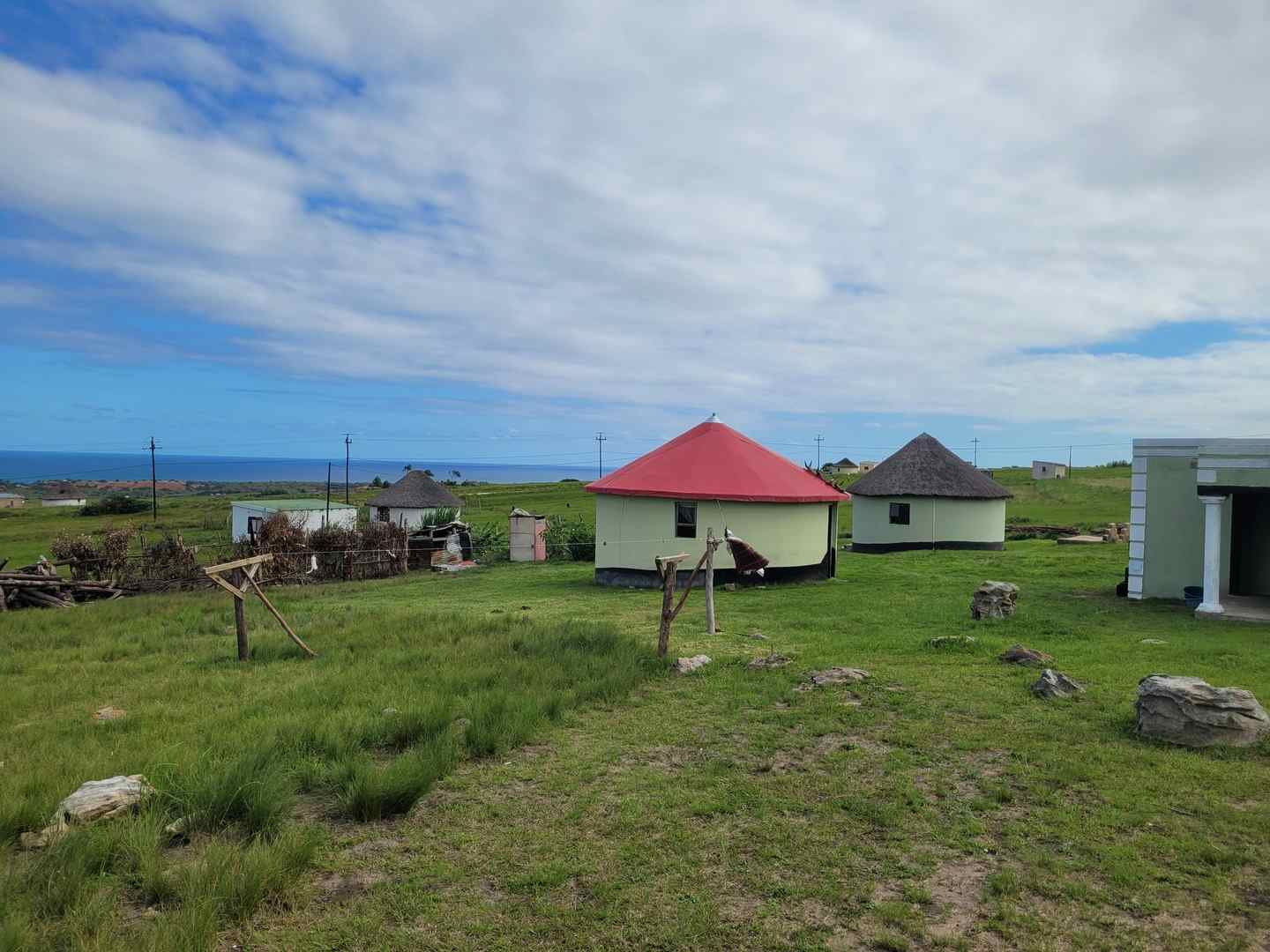
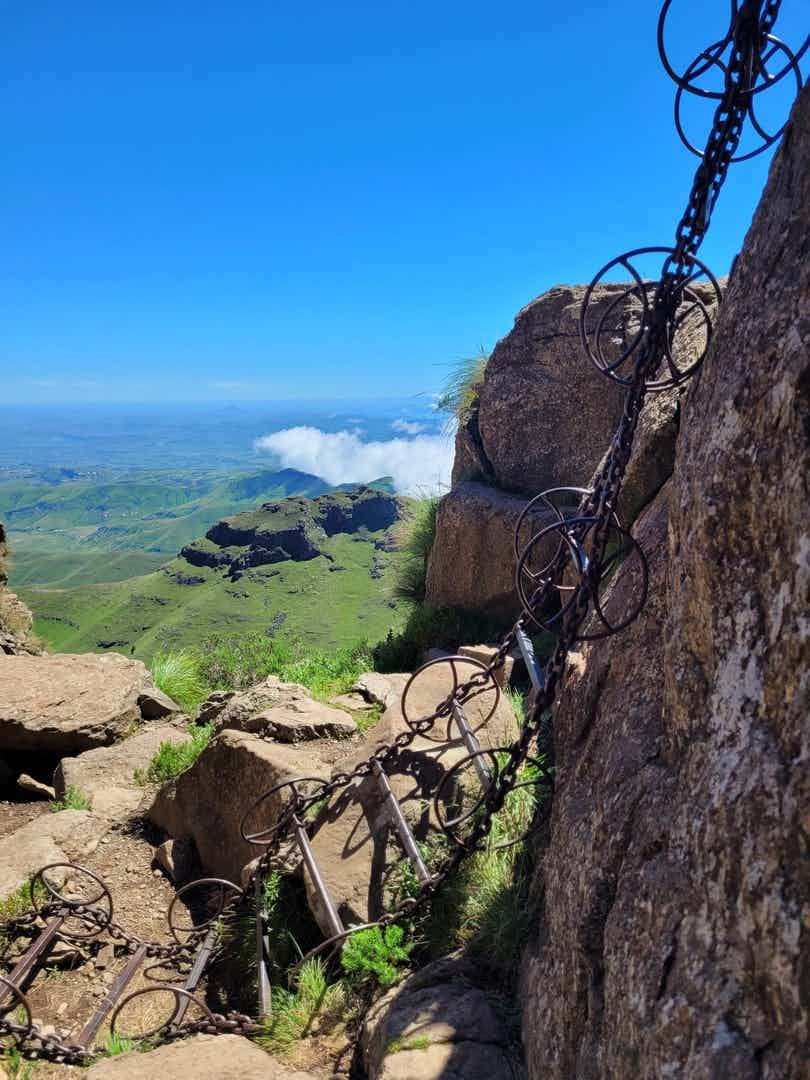
Overall a fantastic trip exploring
Overall a fantastic trip exploring 3 very different regions of South Africa
Fantastic way to see parts
Fantastic way to see parts of South Africa and the guides are brilliant during the walks. Zingela safari where we kayaked down to is a wonderful experience. unfortunately we didn't abseil but in exchange we seen the Giraffes and some wildlife. I went in November so please be aware of how hot and strong the sun will be, advice for the walk along the beach pack light and if you walk barefoot keep applying suncream to your feet they will constantly be wet and in and out of the sand - maybe neoprene socks would be a good choice to prevent burnt feet, I missed the last couple of days due to this. Please also be aware of long car journeys and book enough time to get back on your last day to the airport.
Itinerary Activities
- Guided hike to Sugarloaf Gap in the Drakensberg
- Guided hike to Tugela Falls and Mont-Aux-Sources in the Drakensberg
- Guided hike in the Mahai Valley in the Drakensberg
- Paddle down the Tugela River (by raft or kayak, dependent on water levels)
- Rafting session on the Tugela River (Jan to Mar) or a hike to hidden waterfall
- Optional sunset abseiling experience
- Bush walk in the Tugela River valley
- Guided hike along the Wild Coast
- Guided hike to Mtentu
- Guided kayak along the Mtentu River estuary
- Guided hike and wild swim at Swallowtail Falls
Guides
- Expert, local, English-speaking guides for each section of the trip (the Drakensberg, the Tugela River valley and the Wild Coast)
Accommodation
- 1 night in a resort & spa hotel
- 2 nights in a mountain lodge in the Drakensberg
- 2 nights in a beautiful, unique bush camp
- 1 night in a lodge by the Mtamvuna River
- 1 night in thatched-roof huts at a community homestay
- 2 nights in a river lodge on the Wild Coast
Meals
- All breakfasts
- 7 tasty lunches
- All dinners, including a traditional Xhosa dinner with your homestay hosts
Transfers
- Group arrival transfer from Johannesburg Airport
- Group departure transfer to Durban Airport
- All transfers throughout the trip
Equipment
- All your gear for rafting and kayaking
Permits
- All National Park and Reserve entry fees and permits
Our trips are hassle-free by design. We include all the activities and equipment, as well as many of the meals, so you can simply rock up with your rucksack and share the adventure with your new pals.
Travel to and from the trip
Our trips do not include flights, trains or other travel to the start point and back from the end point.
Tips
Tips are not included in the trip cost. These are entirely at your discretion but there is an expectation to tip for good service. Your guide will help with advice, however we suggest the below as a guideline per person:
- £5/$6/€6 per day
Of course, you are free to tip more or less, and the amount should be reflective of your perception of service and quality - a tip is not compulsory and should only be given when you receive excellent service.
Travel insurance
Travel insurance is compulsory for all of our adventures and you are required to provide your policy information before departing. Your insurance should include adequate protection for overseas medical treatment, evacuation/repatriation, your baggage and equipment and the specific activities involved on your adventure. We also strongly recommend it includes cancellation and curtailment insurance, should you be unable to join your trip for specific reasons such as illness. Our recommended travel insurance provider is Campbell Irvine, as their insurance offers all of the above.
Visas
Visa requirements often change, and you are responsible for obtaining any required visas for this trip. Please check with your nearest embassy or consulate for up-to-date advice.
Personal Expenses
You know your own spending habits best, so please budget an appropriate amount for things like optional meals and drinks, shopping, optional activities, and laundry.
What's included?
- All equipment for rafting and kayaking
What do I need to bring?
BAGS
- Main luggage: a soft duffel bag or suitcase (55-70L capacity; 15kgs)
- Daypack: a medium-sized rucksack (35-45L capacity) which give you enough space to pack for Days 2-4 (hiking in the Drakensberg) and Days 7-9 (hiking on the Mtentu coastline) - your main luggage will be stored for you.
- Waterproof liner for kitbag or rucksack
- Small drybag for the kayaking and wild swimming
CLOTHES
- Waterproof jacket (lightweight and breathable)
- Waterproof trousers (optional)
- Breathable wicking layers
- Fleece jacket or similar for evenings
- Buff or neck-scarf
- Quick-dry shorts or leggings (for hiking and kayaking)
- Hiking trousers/shorts/skirts and casual trousers/jeans
- Synthetic quick-dry t-shirts (for hiking and kayaking) and casual t-shirts
- Underwear and socks
- Swimwear
- Sunglasses (polarised recommended, due to altitude)
- Sunhat
- Sleepwear
- Hiking boots (worn-in) or hiking shoes/trail running shoes
- Sandals
- River/beach shoes or old trainers for kayaking, rafting and wild swimming
EXTRA LAYERS FOR WINTER DATES (MAY TO AUGUST)
- Base layers (merino is best)
- Windproof, warm fleece
- Warm hat
- Lightweight gloves
OTHER
- Insect repellent
- Suncream (SPF50+ recommended, especially in summer)
- Personal first-aid kit (inc. blister treatment, anti-inflammatory/anti-nausea/headache & diarrhea medications + antiseptic & anti-sting cream)
- Personal items (biodegradable soap, shampoo and toiletries, sanitary wear etc)
- Quick-dry hiking towel and a face cloth
- Alcohol hand-gel
- Universal travel plug adapter
- Power bank or solar charger
- Headtorch or torch
- Passports (and visas)
- Travel insurance documents
- Ear plugs
- Reusable water bottles or bladder with 2-litre capacity
- Hiking poles (for the Drakenserg hike, if you normally use them)
- Biodegradable wet-wipes
- Energy bars and snacks - read our article on Best Hiking Snacks
- Credit card and cash (ZAR) for snacks, bar bills etc. (available from the ATM in O.R. Tambo International Airport, Johannesburg)
Optional Private Room Upgrade - 2024 dates
Payable Before Departure
Optional Private Room Upgrade - 2024 dates
…
Optional Private Room Upgrade
Payable Before Departure
Optional Private Room Upgrade
…
We partner with the World Land Trust to ensure this trip achieves Net-Zero emissions. We also support their Buy an Acre programme, helping local communities to buy and protect natural habitats in perpetuity.
What's the number?
It works out on average at 582kg of CO2 emissions per person, including all local transport, accommodation, food, activities, guides, staff and office operations.
The only thing it doesn’t include right now is flights and travel to the destination. We do make an overall estimate across all our customers separately, but as we don’t book flights, have customers from all corners of the world, and no way of reliably knowing their travel plans, we simply can’t include an individual number in the figure on display here. We’ve got a goal to fix that, so that when you book, there is a way to measure and mitigate the carbon emitted by your flight too.
But what does the number mean?
Yep, hard to picture eh? To give you an idea:
- Driving 1000 miles/1609km would be approximately 281kg of CO2 in an average car (or 140.5kg per person, if there were two of you in it).
- A return economy class flight between London and New York would be approximately 1619kg (1.66 tonnes) per person.
- 10 trees in a temperate forest are estimated to remove approximately 250kg of CO2 from the air in a period of 5-10 years.
What are we doing about it?
Our trips are relatively low-carbon by design, and we're working with all our hosts to develop long term carbon reduction plans. We partner with the World Land Trust to ensure this trip achieves Net-Zero emissions. We also support their Buy an Acre programme, helping local communities to buy and protect natural habitats in perpetuity, ensuring the protection of the reserve and its wildlife.
Want to know more?
Amazingly, no international travel company has ever publicly published their carbon measurements before, as far as we know. We believe that must change, quickly. So we’re openly sharing the method we used in the hope that other companies will be able to more easily follow suit and build on what we've done so far. You'll find it all here.
On trips departing in 2026, an extra day will be inserted into the itinerary after Day 5 (making the trip one day longer). On Day 6, you'll have a leisurely day at Zingela Camp, as per the itinerary and with all meals included. You'll then spend a third night at Zingela Camp before heading to the coast on Day 7.
This makes the trip 10 nights instead of 9 nights. Dates on the website are correct and make the allowance for the extra night.
On the Tugela River you'll use double 'sit-on-top' kayaks, which are very stable and easy to paddle for everyone, from new paddlers through to experienced paddlers. The rivercraft available at the Mtentu Estuary is a mix of sit-on-top kayaks and Canadian-style canoes.
The maximum weight limit for the kayaks is 100kg (15st 10lb).
Your host has factored in alternative hiking routes in the Drakensberg and Wild Coast area in case bad weather affects any of the planned routes during the trip. At Zingela, the Tugela River Valley section of the trip, the water levels will dictate which activities you'll take part in: when the water levels are at their highest, groups will raft the river; when they are lower, the river is more suitable for kayaking. If the water levels drop so low as to not allow either rafting or kayaking, your host has factored in an alternative hiking day through the river valley.
Your host will provide clean drinking water throughout the trip and the tap water in South Africa is generally safe in most of the areas you'll be visiting. Make sure to bring along a reusable water bottle to keep with you throughout the adventure.
As this trip starts in Johannesburg and ends in Durban, you won't be able to leave any excess luggage at the start of the trip.
Please read the FAQ titled "Do I have to carry all my stuff for the trip?" regarding how to pack for this trip.
No. For your main bag, bring a soft duffel bag or suitcase (55-70L capacity; max. 15kgs). For your daypack, bring a medium-sized rucksack (35-45L capacity) to carry enough personal items and changes of clothing for Day 2 to Day 4 (hiking in the Drakensberg) and Day 7 to Day 9 (hiking on the Mtentu coastline).
On Day 2, you will leave your main bag at the Cavern Hotel, returning on Day 4 after two nights spent in the mountains at Witsieshoek Mountain Lodge. On Day 7, your main luggage will remain in Port Edward to be collected on Day 10 as you travel to Durban. For these three days hiking in Mtentu, you should plan to hike with everything you need in your daypack.
Please refer to the Kit List for specific items to bring. If you have any questions before travelling, just contact your host who will be happy to advise.
This trip visits locations at or above 2500m, where some people may experience symptoms of Altitude Sickness, also known as Acute Mountain Sickness (AMS).
Previous experience at altitude doesn’t guarantee the same response again – your body can react differently on each trip. However, having been at altitude before is still valuable: it gives you a better understanding of how your body might respond, what symptoms to look out for, and how to manage your pace and energy levels.
Your guide is trained to manage the risk of altitude sickness by controlling the rate of ascent, monitoring group wellbeing, and responding appropriately if anyone feels unwell.
Before booking, we recommend considering your personal health, particularly if you have any pre-existing conditions, and consulting a medical professional if you’re unsure. Arriving early to allow your body to acclimatise can also make a big difference.
Your travel insurance must cover the maximum altitude reached on this trip and include emergency evacuation.
Sure can! Over 70% of our travellers travel solo, it’s a great way to meet like-minded people.
Our team of Adventure Hunters co-create exclusive adventures which are run by highly vetted, specialist hosts. The trip is run by our trusted host partner in the destination. We only work with independent, local, in-destination experts who know the very best places to explore and how to stay safe. Read more information about the local teams we partner with. You’ll be introduced to the host straight after making a booking via the Much Better Adventures platform.
Much Better Adventures refer to the UK Government’s official travel advice when designing trips and monitoring trip operations. We recommend that all customers are familiar with the practical information provided on the Government’s FCDO website, where current travel advice can be found by searching for the applicable destination(s).
For customers joining this trip from other international destinations – please also read the official travel advice applicable to your country of residence/origin, as this may differ.
We recommend checking out the country-specific information and also talking to a travel nurse.
We automatically convert prices from the local currency that a host receives to your chosen currency. We update our exchange rates on a daily basis so this does mean that prices displayed on the site are subject to currency fluctuations, which is why you may see them change over time.
If you wish to change the currency you pay in, head to the bottom of the page.
All of our group adventures are specially designed for adults to enjoy as we want these adventures to bring together outdoorsy people who are truly like-minded. You must be over 18 to join one of our trips.
You're always in good company on one of our adventures.
Our trips are typically made up of a mixture of solo travellers and small groups of 2 or 3 friends, with most in their 30s-50s.
Our sociable adventures are solo-friendly by design and naturally attract outdoorsy people with a shared mindset; a love for adventure, a desire to push themselves and meet awesome, like-minded people along the way.
It’s this camaraderie that has so often turned a great adventure into a life-changing one.
Don't just take our word for it:
- 95% of people rate the group dynamics on our trips 5/5
- 90% of people recommend joining a trip to make new friends
- 75% of people have met people on our trips that they would now consider friends
See here for more info about the Much Better Adventures tribe.
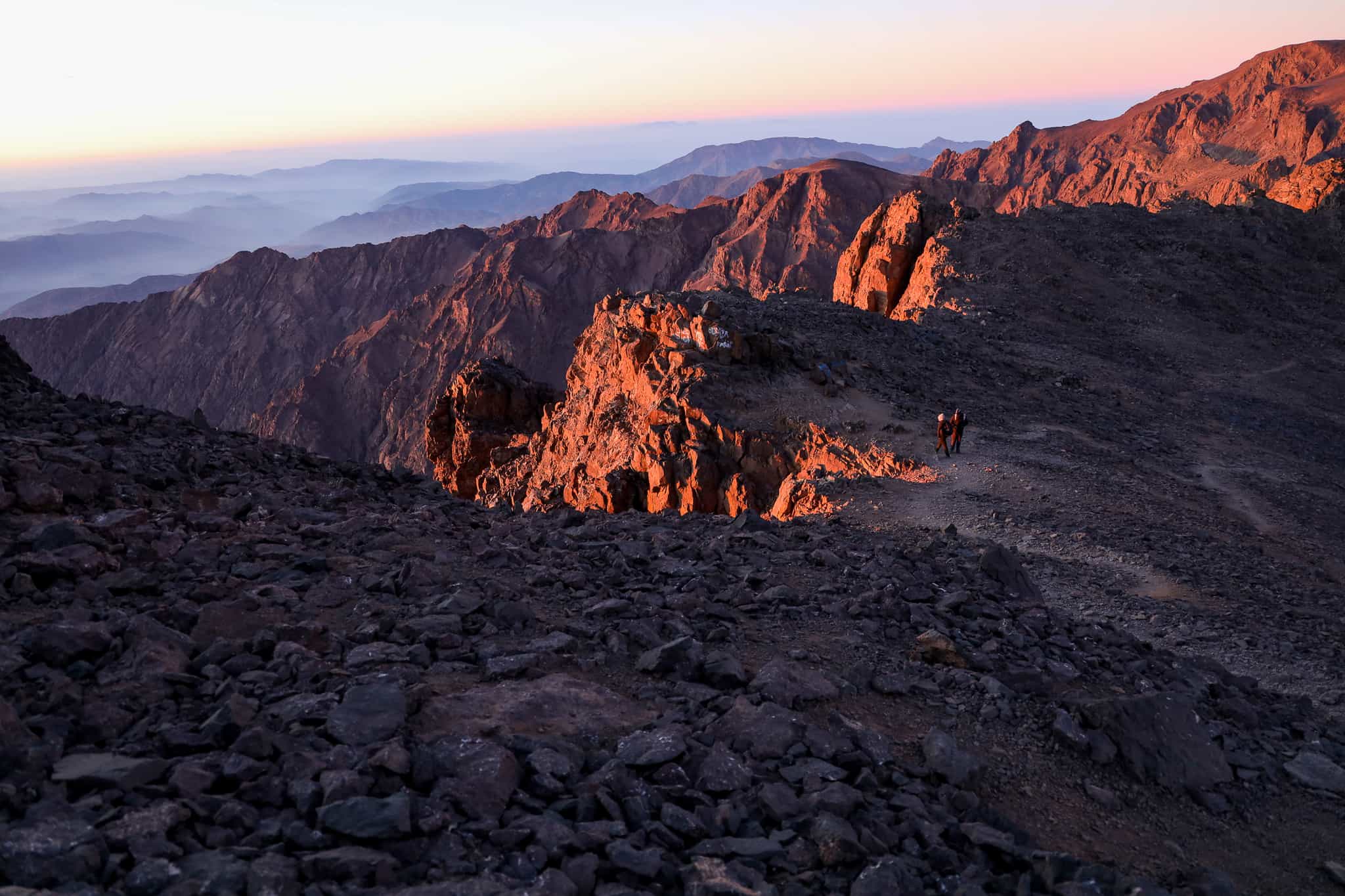
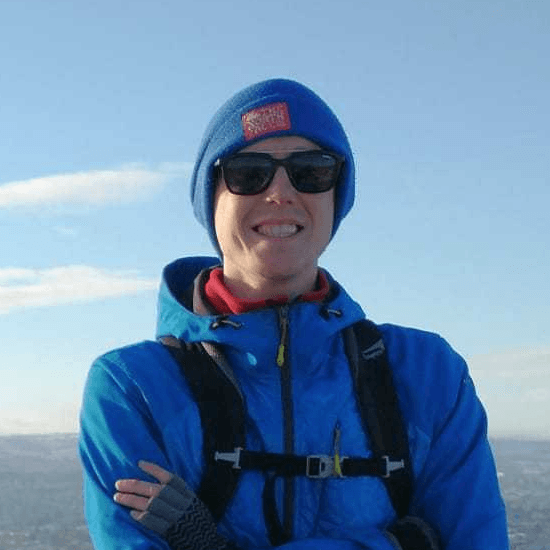
Need help finding flights?
From logistics and how to get there, to fitness, group dynamic and trip difficulty, Rory and his team of friendly experts are on hand to help.
We've got your back
Guaranteed to run
All Much Better Adventures trips are now guaranteed to run. Once you’ve booked your spot you can immediately make your travel arrangements, no uncertainty, no hanging about (excludes 'request to book' departures). Full details
Flexible payments
Secure your spot with the minimum deposit and pay off the remaining balance in as many instalments as you like, with no interest or fees. Full details
Happiness Guarantee
We’re so confident you’ll have an amazing time we’ll put our money on it. Full details
Full financial protection
To give you complete peace of mind Much Better Adventures is backed by ABTOT, ABTA and ATOL memberships. Full details
Tried & Trusted
Much Better Adventures is rated ‘Excellent’ on Trustpilot with over 1000 verified trip reviews averaging 4.8/5.
Connect before you go
You'll be invited to join a WhatsApp group to get to know each other before your big adventure together. Full details
DEPARTURE DATES
Thursday 23rd October 2025
to Saturday 1st November 2025
